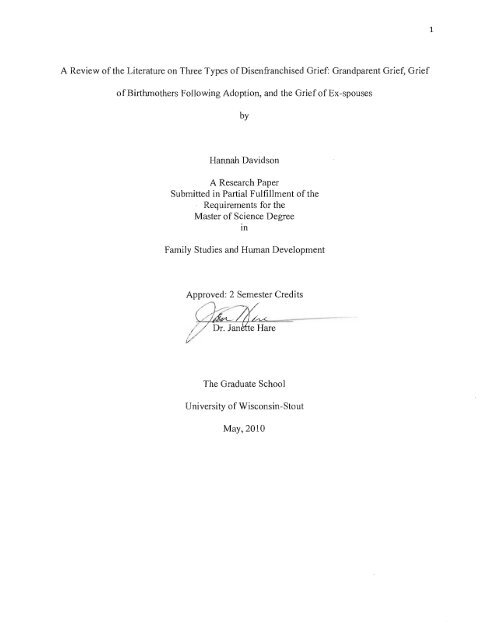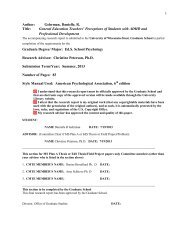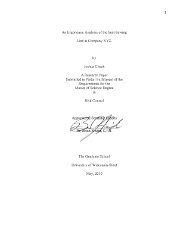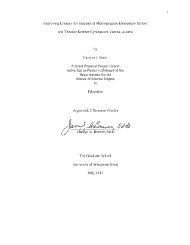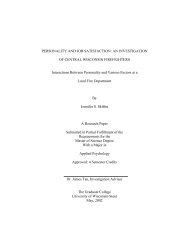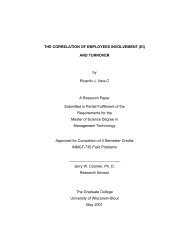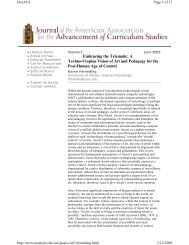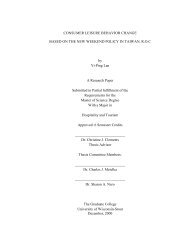A Review of the Literature on Three Types of Disenfranchised Grief ...
A Review of the Literature on Three Types of Disenfranchised Grief ...
A Review of the Literature on Three Types of Disenfranchised Grief ...
Create successful ePaper yourself
Turn your PDF publications into a flip-book with our unique Google optimized e-Paper software.
Author: Davids<strong>on</strong>, Hannah M.<br />
The Graduate School<br />
University <str<strong>on</strong>g>of</str<strong>on</strong>g> Wisc<strong>on</strong>sin-Stout<br />
Menom<strong>on</strong>ie, WI<br />
Title: A <str<strong>on</strong>g>Review</str<strong>on</strong>g> <str<strong>on</strong>g>of</str<strong>on</strong>g> <str<strong>on</strong>g>the</str<strong>on</strong>g> <str<strong>on</strong>g>Literature</str<strong>on</strong>g> <strong>on</strong> <strong>Three</strong> <strong>Types</strong> <str<strong>on</strong>g>of</str<strong>on</strong>g> <strong>Disenfranchised</strong> <strong>Grief</strong>: Grandparent<br />
<strong>Grief</strong>, <strong>Grief</strong> <str<strong>on</strong>g>of</str<strong>on</strong>g> Birthmo<str<strong>on</strong>g>the</str<strong>on</strong>g>rs Following Adopti<strong>on</strong>, and <str<strong>on</strong>g>the</str<strong>on</strong>g> <strong>Grief</strong> <str<strong>on</strong>g>of</str<strong>on</strong>g> Ex-spouses<br />
Graduate Degree/Major: MS Family Studies and Human Development<br />
Research Adviser: Janette Hare, Ph.D.<br />
M<strong>on</strong>thNear: May, 2010<br />
Number <str<strong>on</strong>g>of</str<strong>on</strong>g> Pages: 43<br />
Style Manual Used: American Psychological Associati<strong>on</strong>, 6 th editi<strong>on</strong><br />
Abstract<br />
<strong>Disenfranchised</strong> grief occurs when an individual's grief expelience is not recognized or<br />
acknowledged by o<str<strong>on</strong>g>the</str<strong>on</strong>g>rs. <strong>Disenfranchised</strong> grievers are frequently overlooked or ignored, lack<br />
oppOitunities to express <str<strong>on</strong>g>the</str<strong>on</strong>g>ir emoti<strong>on</strong>s, receive diminished social support and sympathy from<br />
o<str<strong>on</strong>g>the</str<strong>on</strong>g>rs, and may be deprived <str<strong>on</strong>g>of</str<strong>on</strong>g> opportunities to participate in mourning rituals. In o<str<strong>on</strong>g>the</str<strong>on</strong>g>r words,<br />
<str<strong>on</strong>g>the</str<strong>on</strong>g>se individuals are denied <str<strong>on</strong>g>the</str<strong>on</strong>g> "right to grieve". Disenfranchisement is a significant problem<br />
for grievers because it can inhibit coping and complicate <str<strong>on</strong>g>the</str<strong>on</strong>g> grief process.<br />
The purpose <str<strong>on</strong>g>of</str<strong>on</strong>g> this paper is to review <str<strong>on</strong>g>the</str<strong>on</strong>g> existing literature <strong>on</strong> disenfranchised grief<br />
while specifically focusing <strong>on</strong> <str<strong>on</strong>g>the</str<strong>on</strong>g> grief experiences <str<strong>on</strong>g>of</str<strong>on</strong>g> three comm<strong>on</strong>ly disenfranchised groups:<br />
bereaved grandparents, relinquishing birthmo<str<strong>on</strong>g>the</str<strong>on</strong>g>rs, and bereaved ex-spouses. A sec<strong>on</strong>d main<br />
focus <str<strong>on</strong>g>of</str<strong>on</strong>g> this paper is to increase knowledge and awareness <str<strong>on</strong>g>of</str<strong>on</strong>g> disenfranchised grief as <str<strong>on</strong>g>the</str<strong>on</strong>g>re is a<br />
2
paucity <str<strong>on</strong>g>of</str<strong>on</strong>g> research <strong>on</strong> <str<strong>on</strong>g>the</str<strong>on</strong>g> subject. Limitati<strong>on</strong>s <str<strong>on</strong>g>of</str<strong>on</strong>g> current research, implicati<strong>on</strong>s for future<br />
research, and implicati<strong>on</strong>s for practice are also included in this review.<br />
3
The Graduate School<br />
University <str<strong>on</strong>g>of</str<strong>on</strong>g> Wisc<strong>on</strong>sin-Stout<br />
Menom<strong>on</strong>ie, WI<br />
Acknowledgments<br />
I would like to thank my research adviser, Jan Hare, for sparking my interest in <str<strong>on</strong>g>the</str<strong>on</strong>g> area <str<strong>on</strong>g>of</str<strong>on</strong>g><br />
bereavement and grief and for providing me with <str<strong>on</strong>g>the</str<strong>on</strong>g> guidance, feedback, and support I needed<br />
to complete this paper. I would also like to thank Jeanne Rothaupt, my research pr<str<strong>on</strong>g>of</str<strong>on</strong>g>essor, for<br />
helping me complete my research proposal and providing me with lots <str<strong>on</strong>g>of</str<strong>on</strong>g> encomagement.<br />
I would like to thank my husband for his love, patience, and support throughout this l<strong>on</strong>g<br />
process. I would also like to thank my mom for her support and encouragement, as well as her<br />
assistance with pro<str<strong>on</strong>g>of</str<strong>on</strong>g>reading.<br />
4
Table <str<strong>on</strong>g>of</str<strong>on</strong>g> C<strong>on</strong>tents<br />
....................................................................................................................................... Page<br />
Abstract ... .................. ........ .................................................................................................. 2<br />
Chapter I: Introducti<strong>on</strong> ....................................................................................................... 6<br />
Definiti<strong>on</strong> <str<strong>on</strong>g>of</str<strong>on</strong>g> Terms ................................................................................................ 6<br />
<strong>Disenfranchised</strong> <strong>Grief</strong> ............................................................................................. 6<br />
Purpose <str<strong>on</strong>g>of</str<strong>on</strong>g> <str<strong>on</strong>g>the</str<strong>on</strong>g> Study ............................................................................................. 11<br />
Chapter II: Grandparent <strong>Grief</strong>. .......................................................................................... 14<br />
Introducti<strong>on</strong> to Grandparent <strong>Grief</strong> ....................................................................... 14<br />
The Grandparent Bereavement Experience .......................................................... 14<br />
Evidence <str<strong>on</strong>g>of</str<strong>on</strong>g> Disenfranchisement .......................................................................... 16<br />
Chapter III: <strong>Grief</strong> <str<strong>on</strong>g>of</str<strong>on</strong>g> Birthmo<str<strong>on</strong>g>the</str<strong>on</strong>g>rs Following Adopti<strong>on</strong> .................................................. 21<br />
Introducti<strong>on</strong> to Birthmo<str<strong>on</strong>g>the</str<strong>on</strong>g>r GrieL ....................................................................... 21<br />
The Postadoptive Birthmo<str<strong>on</strong>g>the</str<strong>on</strong>g>r Experience ........................................................... 21<br />
Chapter IV: <strong>Grief</strong> <str<strong>on</strong>g>of</str<strong>on</strong>g> Ex-Spouses ...................................................................................... 28<br />
Introducti<strong>on</strong> to <strong>Grief</strong> <str<strong>on</strong>g>of</str<strong>on</strong>g> Ex-Spouses .................................................................... 28<br />
The Bereavement Experience <str<strong>on</strong>g>of</str<strong>on</strong>g> Ex-Spouses ....................................................... 28<br />
Evidence <str<strong>on</strong>g>of</str<strong>on</strong>g> Disenfranchisement .......................................................................... 3 1<br />
Chapter V: Discussi<strong>on</strong> ..................................................................................................... 35<br />
Limitati<strong>on</strong>s <str<strong>on</strong>g>of</str<strong>on</strong>g> Current Research ........................................................................... 35<br />
Implicati<strong>on</strong>s .......................................................................................................... 36<br />
C<strong>on</strong>clusi<strong>on</strong>s ........................................................................................................... 38<br />
References ......................................................................................................................... 40<br />
5
Chapter I: Introducti<strong>on</strong><br />
There are certain loss situati<strong>on</strong>s in which an individual's grief goes unrecognized and<br />
unacknowledged by o<str<strong>on</strong>g>the</str<strong>on</strong>g>rs, a phenomen<strong>on</strong> that has been termed disenfranchised grief (Doka,<br />
1989). These individuals are denied <str<strong>on</strong>g>the</str<strong>on</strong>g> "right to glieve" and are not <str<strong>on</strong>g>of</str<strong>on</strong>g>fered social support,<br />
sympathy, or opportunities to express <str<strong>on</strong>g>the</str<strong>on</strong>g>ir emoti<strong>on</strong>s. <strong>Disenfranchised</strong> grief has serious<br />
implicati<strong>on</strong>s for <str<strong>on</strong>g>the</str<strong>on</strong>g> bereaved as it can serve to complicate <str<strong>on</strong>g>the</str<strong>on</strong>g> bereavement experience and block<br />
<str<strong>on</strong>g>the</str<strong>on</strong>g> grief process (Doka, 2002).<br />
Definiti<strong>on</strong> <str<strong>on</strong>g>of</str<strong>on</strong>g> Terms<br />
defmed:<br />
In order to ensure clarity <str<strong>on</strong>g>of</str<strong>on</strong>g> <str<strong>on</strong>g>the</str<strong>on</strong>g> c<strong>on</strong>tent in this research paper <str<strong>on</strong>g>the</str<strong>on</strong>g> following key terms are<br />
Bereavement: The state <str<strong>on</strong>g>of</str<strong>on</strong>g> being deprived <str<strong>on</strong>g>of</str<strong>on</strong>g> something. The three elements <str<strong>on</strong>g>of</str<strong>on</strong>g><br />
bereavement are (1) a valued relati<strong>on</strong>ship, (2) <str<strong>on</strong>g>the</str<strong>on</strong>g> loss <str<strong>on</strong>g>of</str<strong>on</strong>g> that relati<strong>on</strong>ship, and (3) a<br />
survivor deprived <str<strong>on</strong>g>of</str<strong>on</strong>g> <str<strong>on</strong>g>the</str<strong>on</strong>g> valued pers<strong>on</strong> or thing (Corr, 2003).<br />
<strong>Grief</strong>: The resp<strong>on</strong>se to a loss including physical sensati<strong>on</strong>s, feelings, thoughts, behaviors,<br />
social difficulties, and/or spiritual searching (Corr, 2003).<br />
Grieving: The process <str<strong>on</strong>g>of</str<strong>on</strong>g> coping with loss and grief; <str<strong>on</strong>g>the</str<strong>on</strong>g> attempt to manage <str<strong>on</strong>g>the</str<strong>on</strong>g>se<br />
experiences or learn to live with <str<strong>on</strong>g>the</str<strong>on</strong>g>m (Brabant, 2002).<br />
Mourning: The ways in which loss and grief are socially acknowledged; for example,<br />
wearing a mourning dress to signify a loss (Doka, 2002).<br />
<strong>Disenfranchised</strong> <strong>Grief</strong><br />
The c<strong>on</strong>cept <str<strong>on</strong>g>of</str<strong>on</strong>g> disenfranchised grief was first formally introduced by Kenneth Doka in<br />
1989. In his first anthology <strong>on</strong> <str<strong>on</strong>g>the</str<strong>on</strong>g> subject, Doka defined disenfranchised grief as <str<strong>on</strong>g>the</str<strong>on</strong>g> grief that<br />
individuals feel when <str<strong>on</strong>g>the</str<strong>on</strong>g>y experience a loss that is not "openly aclmowledged, socially<br />
6
validated, or publically mourned" (1989, p. xv). He wrote that each society has a set <str<strong>on</strong>g>of</str<strong>on</strong>g><br />
"grieving rules" that define which losses and which relati<strong>on</strong>ships can legitimately be grieved.<br />
When a loss falls outside <str<strong>on</strong>g>of</str<strong>on</strong>g> <str<strong>on</strong>g>the</str<strong>on</strong>g> society's grieving nOlms, <str<strong>on</strong>g>the</str<strong>on</strong>g> resultant grief remains<br />
unrecognized and unacknowledged and <str<strong>on</strong>g>the</str<strong>on</strong>g> individual is disallowed <str<strong>on</strong>g>the</str<strong>on</strong>g> "right to grieve" (Doka,<br />
2002, p. 5). These individuals are denied <str<strong>on</strong>g>the</str<strong>on</strong>g> benefits typically afforded to enfranchised grievers<br />
such as validati<strong>on</strong>, social support, expressi<strong>on</strong>s <str<strong>on</strong>g>of</str<strong>on</strong>g> sympathy, and accommodati<strong>on</strong>s at work.<br />
Doka published his first anthology after five years <str<strong>on</strong>g>of</str<strong>on</strong>g> exploring <str<strong>on</strong>g>the</str<strong>on</strong>g> c<strong>on</strong>cept <str<strong>on</strong>g>of</str<strong>on</strong>g><br />
disenfranchised grief (Doka, 2002). He had observed that much <str<strong>on</strong>g>of</str<strong>on</strong>g> <str<strong>on</strong>g>the</str<strong>on</strong>g> existing bereavement<br />
literature made reference to grief reacti<strong>on</strong>s that were unsancti<strong>on</strong>ed, unrecognized, or<br />
disenfranchised, and cited numerous instances <str<strong>on</strong>g>of</str<strong>on</strong>g> grievers being denied validati<strong>on</strong> and social<br />
support such as homosexual pat1ners, ex-spouses, and co-workers. Doka recognized <str<strong>on</strong>g>the</str<strong>on</strong>g><br />
increasing need to investigate <str<strong>on</strong>g>the</str<strong>on</strong>g>se grief reacti<strong>on</strong>s that before had been largely ignored. Giving<br />
attenti<strong>on</strong> to <str<strong>on</strong>g>the</str<strong>on</strong>g> topic <str<strong>on</strong>g>of</str<strong>on</strong>g> disenfranchised grief will better inform service providers about <str<strong>on</strong>g>the</str<strong>on</strong>g><br />
unique needs and experiences <str<strong>on</strong>g>of</str<strong>on</strong>g> disenfranchised grievers, and will encourage society to<br />
recognize and acknowledge <str<strong>on</strong>g>the</str<strong>on</strong>g> grief <str<strong>on</strong>g>of</str<strong>on</strong>g> those who have been disenfranchised.<br />
Categories <str<strong>on</strong>g>of</str<strong>on</strong>g> disenfranchised grief. In his first anthology, Doka (1989) suggested three<br />
main aspects <str<strong>on</strong>g>of</str<strong>on</strong>g> bereavement that tend to be disenfranchised:<br />
1. Relati<strong>on</strong>ship not recognized: certain types <str<strong>on</strong>g>of</str<strong>on</strong>g> relati<strong>on</strong>ships may be disenfranchised<br />
including those that are n<strong>on</strong>-traditi<strong>on</strong>al or unsancti<strong>on</strong>ed (e.g. homosexual, extramarital),<br />
those that are not perceived as being close enough (e.g. friends, co-workers) or those that<br />
existed primarily in <str<strong>on</strong>g>the</str<strong>on</strong>g> past (e.g. ex-spouses, former friends, past lovers).<br />
7
2. Loss not acknowledged: losses are disenfranchised when <str<strong>on</strong>g>the</str<strong>on</strong>g>y are not perceived as being<br />
significant; examples include miscaniages, aborti<strong>on</strong>s, adopti<strong>on</strong>s, and <str<strong>on</strong>g>the</str<strong>on</strong>g> death <str<strong>on</strong>g>of</str<strong>on</strong>g> a<br />
compani<strong>on</strong> animal.<br />
3. Griever excluded: grievers are disenfranchised when <str<strong>on</strong>g>the</str<strong>on</strong>g>y are socially defined as being<br />
incapable <str<strong>on</strong>g>of</str<strong>on</strong>g> understanding death or experiencing grief; comm<strong>on</strong>ly disenfranchised<br />
groups include young children, <str<strong>on</strong>g>the</str<strong>on</strong>g> elderly, <str<strong>on</strong>g>the</str<strong>on</strong>g> developmentally disabled, and <str<strong>on</strong>g>the</str<strong>on</strong>g><br />
mentally ill.<br />
In his sec<strong>on</strong>d anthology, Doka (2002) suggested two additi<strong>on</strong>al categories <str<strong>on</strong>g>of</str<strong>on</strong>g><br />
disenfranchisement:<br />
4. Circumstances <str<strong>on</strong>g>of</str<strong>on</strong>g> death: deaths that are stigmatized or evoke anxiety (e.g. deaths<br />
resulting from AIDS, suicides, or executi<strong>on</strong>s) may be disenfranchised because <str<strong>on</strong>g>the</str<strong>on</strong>g>y<br />
inhibit both <str<strong>on</strong>g>the</str<strong>on</strong>g> giving and receiving <str<strong>on</strong>g>of</str<strong>on</strong>g> social support.<br />
5. Ways individuals grieve: an individual's style <str<strong>on</strong>g>of</str<strong>on</strong>g> grieving can c<strong>on</strong>tribute to<br />
disenfranchisement when it c<strong>on</strong>flicts with social expectati<strong>on</strong>s about what is appropriate;<br />
examples include an instrumental griever who fails to show emoti<strong>on</strong>, or an intuitive<br />
griever who exhibits excessive emoti<strong>on</strong>.<br />
Corr (2002) emphasized that disenfranchisement occurs in more ways than those first<br />
suggested by Doka. Corr maintained that disenfranchisement <str<strong>on</strong>g>of</str<strong>on</strong>g> <str<strong>on</strong>g>the</str<strong>on</strong>g> grief experience can also<br />
occur in <str<strong>on</strong>g>the</str<strong>on</strong>g> following ways:<br />
1. Defining certain aspects <str<strong>on</strong>g>of</str<strong>on</strong>g> <str<strong>on</strong>g>the</str<strong>on</strong>g> grief resp<strong>on</strong>se as inappropriate or illegitimate:<br />
feelings and emoti<strong>on</strong>s are <str<strong>on</strong>g>of</str<strong>on</strong>g>ten deemed an acceptable part <str<strong>on</strong>g>of</str<strong>on</strong>g> grieving while o<str<strong>on</strong>g>the</str<strong>on</strong>g>r<br />
elements <str<strong>on</strong>g>of</str<strong>on</strong>g> <str<strong>on</strong>g>the</str<strong>on</strong>g> grief reacti<strong>on</strong> are disenfranchised; examples include physical sensati<strong>on</strong>s,<br />
behavioral disturbances, and changes in social and cognitive functi<strong>on</strong>ing.<br />
8
2. Grieving: <str<strong>on</strong>g>the</str<strong>on</strong>g> grieving process is disenfranchised when <str<strong>on</strong>g>the</str<strong>on</strong>g> importance <str<strong>on</strong>g>of</str<strong>on</strong>g> public<br />
mourning rituals is discounted, when <str<strong>on</strong>g>the</str<strong>on</strong>g> "intrapsychic work" (p. 53) <str<strong>on</strong>g>of</str<strong>on</strong>g> grieving is<br />
disregarded, or when unrealistic expectati<strong>on</strong>s ate placed <strong>on</strong> grievers (e.g. to stop<br />
"dwelling <strong>on</strong> it").<br />
3. Assuming that <str<strong>on</strong>g>the</str<strong>on</strong>g>re is an endpoint to grieving: this assumpti<strong>on</strong> disenfranchises those<br />
who c<strong>on</strong>tinue to grieve because it implies that grief is a negative state <str<strong>on</strong>g>of</str<strong>on</strong>g> being that needs<br />
to be recovered from, it denies legitimacy to grief that occurs after <str<strong>on</strong>g>the</str<strong>on</strong>g> assumed endpoint,<br />
and it fails to acknowledge <str<strong>on</strong>g>the</str<strong>on</strong>g> irrunense impact <str<strong>on</strong>g>of</str<strong>on</strong>g> significant losses.<br />
Why disenfranchisement occurs. Why is grief disenfranchised? A primary reas<strong>on</strong> is<br />
that our society places a high value <strong>on</strong> <str<strong>on</strong>g>the</str<strong>on</strong>g> traditi<strong>on</strong>al family, and we have made this value<br />
evident in om social norms and policies (Doka, 2002). Family ties have legal standing and are<br />
easily recognizable, while extra-familial ties are less c<strong>on</strong>crete. Kamerman (1993) suggested that<br />
disenfranchised grief functi<strong>on</strong>s to streng<str<strong>on</strong>g>the</str<strong>on</strong>g>n <str<strong>on</strong>g>the</str<strong>on</strong>g> traditi<strong>on</strong>al family by denying social recogniti<strong>on</strong><br />
to n<strong>on</strong>-traditi<strong>on</strong>al or unsancti<strong>on</strong>ed relati<strong>on</strong>ships. To acknowledge that same-sex partners or<br />
unmarried heterosexual lovers experience intense grief would be to extend to <str<strong>on</strong>g>the</str<strong>on</strong>g>m <str<strong>on</strong>g>the</str<strong>on</strong>g> same<br />
social recogniti<strong>on</strong> and support that is <str<strong>on</strong>g>of</str<strong>on</strong>g>fered to family members. In doing so, traditi<strong>on</strong>al familial<br />
relati<strong>on</strong>ships may be undermined. In his 1993 article Kamerman also suggested that perhaps<br />
<str<strong>on</strong>g>the</str<strong>on</strong>g>re is a limited amount <str<strong>on</strong>g>of</str<strong>on</strong>g> available social sympathy and support, and that if <str<strong>on</strong>g>the</str<strong>on</strong>g> circle <str<strong>on</strong>g>of</str<strong>on</strong>g><br />
legitimate grievers were to be enlarged <str<strong>on</strong>g>the</str<strong>on</strong>g>re would be less support available to irrunediate family<br />
members.<br />
C<strong>on</strong>sequences <str<strong>on</strong>g>of</str<strong>on</strong>g> disenfranchised grief. When grief is disenfranchised, it can serve to<br />
complicate <str<strong>on</strong>g>the</str<strong>on</strong>g> bereavement experience in two significant ways. First, it can intensify <str<strong>on</strong>g>the</str<strong>on</strong>g><br />
emoti<strong>on</strong>al reacti<strong>on</strong>s associated with grief (Doka, 2002). Sadness, guilt, anger, and l<strong>on</strong>eliness are<br />
9
am<strong>on</strong>g <str<strong>on</strong>g>the</str<strong>on</strong>g> emoti<strong>on</strong>s comm<strong>on</strong>ly experienced during bereavement. When individuals fail to<br />
recognize that <str<strong>on</strong>g>the</str<strong>on</strong>g>y have <str<strong>on</strong>g>the</str<strong>on</strong>g> right to grieve, as is <str<strong>on</strong>g>of</str<strong>on</strong>g>ten <str<strong>on</strong>g>the</str<strong>on</strong>g> case with disenfranchisement, <str<strong>on</strong>g>the</str<strong>on</strong>g>y are<br />
likely to avoid expressing <str<strong>on</strong>g>the</str<strong>on</strong>g>ir emoti<strong>on</strong>s. C<strong>on</strong>sequently, when <str<strong>on</strong>g>the</str<strong>on</strong>g>se emoti<strong>on</strong>s are not<br />
c<strong>on</strong>fr<strong>on</strong>ted, processed, or expressed <str<strong>on</strong>g>the</str<strong>on</strong>g>y are likely to become intensified (Lenhardt, 1997).<br />
Sec<strong>on</strong>d, disenfranchisement complicates <str<strong>on</strong>g>the</str<strong>on</strong>g> bereavement experience by diminishing social<br />
support available to <str<strong>on</strong>g>the</str<strong>on</strong>g> griever. These grievers are denied time <str<strong>on</strong>g>of</str<strong>on</strong>g>f from work, deprived <str<strong>on</strong>g>of</str<strong>on</strong>g> <str<strong>on</strong>g>the</str<strong>on</strong>g><br />
opportunity to openly discuss <str<strong>on</strong>g>the</str<strong>on</strong>g>ir feelings, and left out <str<strong>on</strong>g>of</str<strong>on</strong>g> expressi<strong>on</strong>s <str<strong>on</strong>g>of</str<strong>on</strong>g> sympathy and support<br />
(Doka, 2002). Because social support helps to facilitate coping and healing, its absence can serve<br />
to block <str<strong>on</strong>g>the</str<strong>on</strong>g> grieving process (Lenhardt, 1997).<br />
Self-disenfranchisement. KauffInan (2002) expanded <strong>on</strong> Doka's original c<strong>on</strong>cepti<strong>on</strong> <str<strong>on</strong>g>of</str<strong>on</strong>g><br />
disenfranchised grief by suggesting that individuals can c<strong>on</strong>tribute to <str<strong>on</strong>g>the</str<strong>on</strong>g>ir own<br />
disenfranchisement. Self-disenfranchisement occurs when individuals refuse or are unable to<br />
acknowledge <str<strong>on</strong>g>the</str<strong>on</strong>g>ir own grief as being legitimate, due to real or imagined input from o<str<strong>on</strong>g>the</str<strong>on</strong>g>rs.<br />
When people fail to recognize <str<strong>on</strong>g>the</str<strong>on</strong>g> validity <str<strong>on</strong>g>of</str<strong>on</strong>g> <str<strong>on</strong>g>the</str<strong>on</strong>g>ir own grief it can cause feelings <str<strong>on</strong>g>of</str<strong>on</strong>g> shame or<br />
guilt, and can deter <str<strong>on</strong>g>the</str<strong>on</strong>g>m from seeking out social support. Kauffman also suggested that<br />
disenfranchised grievers experience not <strong>on</strong>ly grief over <str<strong>on</strong>g>the</str<strong>on</strong>g> loss itself, but also grief over <str<strong>on</strong>g>the</str<strong>on</strong>g>ir<br />
own disenfranchisement. This compounded grief can <str<strong>on</strong>g>the</str<strong>on</strong>g>n cause psychological damage to <str<strong>on</strong>g>the</str<strong>on</strong>g><br />
grIever.<br />
Empirical research. In Doka's sec<strong>on</strong>d anthology, Thornt<strong>on</strong> & Zanich (2002) reviewed a<br />
decade <str<strong>on</strong>g>of</str<strong>on</strong>g> empirical research <strong>on</strong> disenfranchised grief. Am<strong>on</strong>g <str<strong>on</strong>g>the</str<strong>on</strong>g> literature reviewed is a study<br />
assessing college students' evaluati<strong>on</strong>s <str<strong>on</strong>g>of</str<strong>on</strong>g> social support in disenfranchised grief situati<strong>on</strong>s<br />
(Thornt<strong>on</strong>, Roberts<strong>on</strong>, & Mlecko, 1991). When asked to make judgments about various<br />
scenarios that involved unrecognized losses or unsancti<strong>on</strong>ed relati<strong>on</strong>ships, participants reported<br />
10
that a grief reacti<strong>on</strong> was less likely, expressi<strong>on</strong>s <str<strong>on</strong>g>of</str<strong>on</strong>g> sympathy toward <str<strong>on</strong>g>the</str<strong>on</strong>g> griever were less<br />
appropriate, and that <str<strong>on</strong>g>the</str<strong>on</strong>g>re would be less social support available to <str<strong>on</strong>g>the</str<strong>on</strong>g> griever. Ano<str<strong>on</strong>g>the</str<strong>on</strong>g>r study<br />
c<strong>on</strong>ducted by Cohen (1997) focused <strong>on</strong> college students' grief resp<strong>on</strong>ses to various types <str<strong>on</strong>g>of</str<strong>on</strong>g><br />
death and n<strong>on</strong>-death losses. He found that participants were less likely to seek out help and<br />
social support when <str<strong>on</strong>g>the</str<strong>on</strong>g>y perceived a lack <str<strong>on</strong>g>of</str<strong>on</strong>g> recogniti<strong>on</strong> <str<strong>on</strong>g>of</str<strong>on</strong>g> <str<strong>on</strong>g>the</str<strong>on</strong>g>ir grief by o<str<strong>on</strong>g>the</str<strong>on</strong>g>rs (i.e.<br />
disenfranchised losses). Based <strong>on</strong> <str<strong>on</strong>g>the</str<strong>on</strong>g> available literature, Thornt<strong>on</strong> & Zanich (2002) c<strong>on</strong>cluded<br />
that people do in fact perceive losses differently depending <strong>on</strong> <str<strong>on</strong>g>the</str<strong>on</strong>g> type <str<strong>on</strong>g>of</str<strong>on</strong>g> loss, <str<strong>on</strong>g>the</str<strong>on</strong>g> type <str<strong>on</strong>g>of</str<strong>on</strong>g><br />
relati<strong>on</strong>ship, and <str<strong>on</strong>g>the</str<strong>on</strong>g> type <str<strong>on</strong>g>of</str<strong>on</strong>g> griever. As Cohen's study (1997) suggests, <str<strong>on</strong>g>the</str<strong>on</strong>g>se "grieving rules"<br />
are so widely held that <str<strong>on</strong>g>the</str<strong>on</strong>g>y are even accepted by grievers <str<strong>on</strong>g>the</str<strong>on</strong>g>mselves. The rules not <strong>on</strong>ly deter<br />
caregivers from providing social support, but <str<strong>on</strong>g>the</str<strong>on</strong>g>y also discourage grievers from seeking out<br />
social support. When grievers lack support and validati<strong>on</strong>, <str<strong>on</strong>g>the</str<strong>on</strong>g>ir grief is likely to become<br />
complicated.<br />
Purpose <str<strong>on</strong>g>of</str<strong>on</strong>g> <str<strong>on</strong>g>the</str<strong>on</strong>g> Study<br />
The purpose <str<strong>on</strong>g>of</str<strong>on</strong>g> this paper is to explore <str<strong>on</strong>g>the</str<strong>on</strong>g> c<strong>on</strong>cept <str<strong>on</strong>g>of</str<strong>on</strong>g> disenfranchised grief by reviewing<br />
available literature <strong>on</strong> three types: grandparent grief, grief <str<strong>on</strong>g>of</str<strong>on</strong>g> birthmo<str<strong>on</strong>g>the</str<strong>on</strong>g>rs following adopti<strong>on</strong>,<br />
and <str<strong>on</strong>g>the</str<strong>on</strong>g> grief <str<strong>on</strong>g>of</str<strong>on</strong>g> ex -spouses.<br />
Grandparent grief. When a child dies, much <str<strong>on</strong>g>of</str<strong>on</strong>g> <str<strong>on</strong>g>the</str<strong>on</strong>g> attenti<strong>on</strong> is focused <strong>on</strong> <str<strong>on</strong>g>the</str<strong>on</strong>g><br />
immediate family while <str<strong>on</strong>g>the</str<strong>on</strong>g> grief <str<strong>on</strong>g>of</str<strong>on</strong>g> <str<strong>on</strong>g>the</str<strong>on</strong>g> child's grandparents tends to be disenfranchised<br />
(P<strong>on</strong>zerti & Johns<strong>on</strong>, 1991). Research indicates that grandparents typically do experience<br />
complex and intense grief reacti<strong>on</strong>s; <str<strong>on</strong>g>the</str<strong>on</strong>g>y not <strong>on</strong>ly grieve <str<strong>on</strong>g>the</str<strong>on</strong>g> loss <str<strong>on</strong>g>of</str<strong>on</strong>g> <str<strong>on</strong>g>the</str<strong>on</strong>g>ir grandchild, but also<br />
grieve over <str<strong>on</strong>g>the</str<strong>on</strong>g> pain experienced by <str<strong>on</strong>g>the</str<strong>on</strong>g>ir bereaved adult child, <str<strong>on</strong>g>the</str<strong>on</strong>g> deceased child's parent (Fry,<br />
1997; Nehari, Grebler, & Toren, 2007; P<strong>on</strong>zerti, 1992; P<strong>on</strong>zetti & Johns<strong>on</strong>, 1991). This<br />
11
disenfranchised grief situati<strong>on</strong> falls into Doka's first category-<str<strong>on</strong>g>the</str<strong>on</strong>g> relati<strong>on</strong>ship is not recognized<br />
as being significant.<br />
<strong>Grief</strong> <str<strong>on</strong>g>of</str<strong>on</strong>g> birthmo<str<strong>on</strong>g>the</str<strong>on</strong>g>rs following adopti<strong>on</strong>. Women who relinquish a child for adopti<strong>on</strong><br />
generally experience intense grief over <str<strong>on</strong>g>the</str<strong>on</strong>g> loss <str<strong>on</strong>g>of</str<strong>on</strong>g> <str<strong>on</strong>g>the</str<strong>on</strong>g>ir baby (Aloi, 2009; Askren & Bloom,<br />
1999; Blant<strong>on</strong> & Deschner, 1990; De Sim<strong>on</strong>e, 1996; Henney, Ayers-Lopez, McRoy, &<br />
Grotevant, 2007; Lauderdale & Boyle, 1994; Logan, 1996). Health care pr<str<strong>on</strong>g>of</str<strong>on</strong>g>essi<strong>on</strong>als and<br />
society in general tend to minimize <str<strong>on</strong>g>the</str<strong>on</strong>g> seriousness <str<strong>on</strong>g>of</str<strong>on</strong>g> this loss situati<strong>on</strong>; it is <str<strong>on</strong>g>of</str<strong>on</strong>g>ten assumed that<br />
since <str<strong>on</strong>g>the</str<strong>on</strong>g> child did not die, and since <str<strong>on</strong>g>the</str<strong>on</strong>g> relinquishment is voluntary, birthmo<str<strong>on</strong>g>the</str<strong>on</strong>g>rs do not grieve.<br />
Intensified feelings <str<strong>on</strong>g>of</str<strong>on</strong>g> sadness, anger, l<strong>on</strong>eliness, embarrassment, depressi<strong>on</strong>, and regret are<br />
comm<strong>on</strong> in disenfranchised birth mo<str<strong>on</strong>g>the</str<strong>on</strong>g>rs. As with o<str<strong>on</strong>g>the</str<strong>on</strong>g>r types <str<strong>on</strong>g>of</str<strong>on</strong>g> disenfranchised grievers,<br />
relinquishing birthmo<str<strong>on</strong>g>the</str<strong>on</strong>g>rs are denied <str<strong>on</strong>g>the</str<strong>on</strong>g> opportunity to express <str<strong>on</strong>g>the</str<strong>on</strong>g>se emoti<strong>on</strong>s and are <str<strong>on</strong>g>of</str<strong>on</strong>g>fered<br />
minimal social support. The general lack <str<strong>on</strong>g>of</str<strong>on</strong>g> acknowledgement <str<strong>on</strong>g>of</str<strong>on</strong>g> <str<strong>on</strong>g>the</str<strong>on</strong>g>ir grief can also c<strong>on</strong>tribute<br />
to feelings <str<strong>on</strong>g>of</str<strong>on</strong>g> embarrassment and shame. This disenfranchised grief situati<strong>on</strong> falls into Doka's<br />
sec<strong>on</strong>d category-<str<strong>on</strong>g>the</str<strong>on</strong>g> loss is not acknowledged as being significant.<br />
<strong>Grief</strong> <str<strong>on</strong>g>of</str<strong>on</strong>g> ex-spouses. While a spouse's grief is widely recognized, it is <str<strong>on</strong>g>of</str<strong>on</strong>g>ten assumed that<br />
divorced individuals will not experience grief over <str<strong>on</strong>g>the</str<strong>on</strong>g> death <str<strong>on</strong>g>of</str<strong>on</strong>g> <str<strong>on</strong>g>the</str<strong>on</strong>g>ir ex-spouse (Doka, 2002).<br />
Doka (2002) emphasized that although divorce ends a marriage, it does not necessarily end <str<strong>on</strong>g>the</str<strong>on</strong>g><br />
relati<strong>on</strong>ship. Many ex-spouses maintain c<strong>on</strong>tinued mutual c<strong>on</strong>tact with in-laws and shared<br />
children, and have <strong>on</strong>going ec<strong>on</strong>omic ties such as child support or joint property. Ex-spouses<br />
may also have c<strong>on</strong>tinuing emoti<strong>on</strong>al ties including str<strong>on</strong>g ambivalent feelings toward <strong>on</strong>e ano<str<strong>on</strong>g>the</str<strong>on</strong>g>r<br />
or hopes <str<strong>on</strong>g>of</str<strong>on</strong>g> possible rec<strong>on</strong>ciliati<strong>on</strong>. Available research suggests that divorced individuals do in<br />
fact experience grief reacti<strong>on</strong>s over <str<strong>on</strong>g>the</str<strong>on</strong>g> death <str<strong>on</strong>g>of</str<strong>on</strong>g> <str<strong>on</strong>g>the</str<strong>on</strong>g>ir ex-spouse (Doka, 1986; Scott, 2000).<br />
However because <str<strong>on</strong>g>the</str<strong>on</strong>g> ex-spouse relati<strong>on</strong>ship is not recognized as being significant, <str<strong>on</strong>g>the</str<strong>on</strong>g>se grievers<br />
12
eport feeling as if <str<strong>on</strong>g>the</str<strong>on</strong>g>ir grief is unrecognized by o<str<strong>on</strong>g>the</str<strong>on</strong>g>rs, feeling c<strong>on</strong>fused about <str<strong>on</strong>g>the</str<strong>on</strong>g>ir ambiguous<br />
mourning role, and experiencing a general lack <str<strong>on</strong>g>of</str<strong>on</strong>g> social support (Doka, 2002). This<br />
disenfranchised grief situati<strong>on</strong> falls into Doka's first category-<str<strong>on</strong>g>the</str<strong>on</strong>g> relati<strong>on</strong>ship is not recognized<br />
as being significant.<br />
Limitati<strong>on</strong>s <str<strong>on</strong>g>of</str<strong>on</strong>g> current research, implicati<strong>on</strong>s for future research, and implicati<strong>on</strong>s for<br />
practice are also included in this review. The literature search c<strong>on</strong>ducted for this paper covers<br />
1975, <str<strong>on</strong>g>the</str<strong>on</strong>g> year <str<strong>on</strong>g>the</str<strong>on</strong>g> first article acknowledging <str<strong>on</strong>g>the</str<strong>on</strong>g> challenges <str<strong>on</strong>g>of</str<strong>on</strong>g> grandparent bereavement was<br />
published, to <str<strong>on</strong>g>the</str<strong>on</strong>g> present.<br />
13
Introducti<strong>on</strong> to Grandparent <strong>Grief</strong><br />
Chapter II: Grandparent <strong>Grief</strong><br />
The experience <str<strong>on</strong>g>of</str<strong>on</strong>g> losing a grandchild is extremely difficult and presents <str<strong>on</strong>g>the</str<strong>on</strong>g> bereaved<br />
grandparent with a variety <str<strong>on</strong>g>of</str<strong>on</strong>g> unique challenges (Reed, 2000). As bereaved grandparents<br />
struggle to come to terms with <str<strong>on</strong>g>the</str<strong>on</strong>g> loss, <str<strong>on</strong>g>the</str<strong>on</strong>g>y comm<strong>on</strong>ly experience a lack <str<strong>on</strong>g>of</str<strong>on</strong>g> acknowledgement<br />
<str<strong>on</strong>g>of</str<strong>on</strong>g> <str<strong>on</strong>g>the</str<strong>on</strong>g>ir grief which can c<strong>on</strong>tribute to feelings <str<strong>on</strong>g>of</str<strong>on</strong>g> l<strong>on</strong>eliness, isolati<strong>on</strong>, and shame (De Frain,<br />
Jakub, & Mendoza, 1991; Fry, 1997; Galinsky, 2001; P<strong>on</strong>zetti & Johns<strong>on</strong>, 1991). Bereaved<br />
grandparents also feel sadness for grieving family members, experience pers<strong>on</strong>al guilt, and feel<br />
resp<strong>on</strong>sibility to provide support to surviving children and grandchildren (De Frain et ai., 1991;<br />
Fry, 1997; Galinsky, 2001; Nehari et ai., 2007; P<strong>on</strong>zetti, 1992; P<strong>on</strong>zetti & Johns<strong>on</strong>, 1991; White,<br />
Walker, & Richards, 2008). This review <str<strong>on</strong>g>of</str<strong>on</strong>g> <str<strong>on</strong>g>the</str<strong>on</strong>g> literature will address some <str<strong>on</strong>g>of</str<strong>on</strong>g> <str<strong>on</strong>g>the</str<strong>on</strong>g> comm<strong>on</strong><br />
<str<strong>on</strong>g>the</str<strong>on</strong>g>mes associated with grandparent grief and its disenfranchisement, and will underscore <str<strong>on</strong>g>the</str<strong>on</strong>g><br />
need for fur<str<strong>on</strong>g>the</str<strong>on</strong>g>r study.<br />
The Grandparent Bereavement Experience<br />
Bereaved grandparents generally describe <str<strong>on</strong>g>the</str<strong>on</strong>g> loss <str<strong>on</strong>g>of</str<strong>on</strong>g><str<strong>on</strong>g>the</str<strong>on</strong>g>ir grandchild as being an<br />
extremely painful and difficult experience (De Frain et ai., 1991; Fry, 1997; Galinsky, 2001;<br />
Nehari et ai., 2007; P<strong>on</strong>zetti, 1992; P<strong>on</strong>zetti & JOMs<strong>on</strong>, 1991, White et ai., 2008). Research<br />
suggests that <str<strong>on</strong>g>the</str<strong>on</strong>g> grandparent-grandchild relati<strong>on</strong>ship is <strong>on</strong>e <str<strong>on</strong>g>of</str<strong>on</strong>g> high quality-most grandparents<br />
report frequent and enjoyable c<strong>on</strong>tact with <str<strong>on</strong>g>the</str<strong>on</strong>g>ir grandchildren and state that <str<strong>on</strong>g>the</str<strong>on</strong>g>y highly value<br />
<str<strong>on</strong>g>the</str<strong>on</strong>g> relati<strong>on</strong>ship (P<strong>on</strong>zetti & Johns<strong>on</strong>, 1991). Taking this into c<strong>on</strong>siderati<strong>on</strong>, it is no w<strong>on</strong>der that<br />
bereaved grandparents experience such intense grief.<br />
Bereaved grandparents report experiencing intense emoti<strong>on</strong>s in <str<strong>on</strong>g>the</str<strong>on</strong>g> days, weeks, and<br />
m<strong>on</strong>ths following <str<strong>on</strong>g>the</str<strong>on</strong>g> loss. Feelings <str<strong>on</strong>g>of</str<strong>on</strong>g> disbelief, shock, numbness, guilt, regret, anger, sadness,<br />
14
l<strong>on</strong>eliness, anxiety, and depressi<strong>on</strong> are am<strong>on</strong>g those most comm<strong>on</strong>ly reported (De Frain et ai.,<br />
1991; Fry, 1997; Galinsky, 2001; Nehari et ai., 2007; P<strong>on</strong>zetti & lohns<strong>on</strong>, 1991). Bereaved<br />
grandparents may also experience physical symptoms including insomnia, chest pain, and<br />
shortness <str<strong>on</strong>g>of</str<strong>on</strong>g> breath, and are at an increased risk for substance abuse problems (Fry, 1997;<br />
Galinsky, 2001).<br />
The most comm<strong>on</strong> <str<strong>on</strong>g>the</str<strong>on</strong>g>me in <str<strong>on</strong>g>the</str<strong>on</strong>g> grandparent bereavement literature is that grandparents<br />
grieve not <strong>on</strong>ly for <str<strong>on</strong>g>the</str<strong>on</strong>g>ir deceased grandchild but also for <str<strong>on</strong>g>the</str<strong>on</strong>g>ir bereaved adult child (Fry, 1997;<br />
Nehari et al., 2007; P<strong>on</strong>zetti, 1992; P<strong>on</strong>zetti & lohns<strong>on</strong>, 1991; Reed, 2000). Fry (1997) used <str<strong>on</strong>g>the</str<strong>on</strong>g><br />
tenn "doubly bereaved" (p. 136) to describe grandparents' unique bereavement situati<strong>on</strong>.<br />
Grandparents grieve over <str<strong>on</strong>g>the</str<strong>on</strong>g> loss <str<strong>on</strong>g>of</str<strong>on</strong>g> <str<strong>on</strong>g>the</str<strong>on</strong>g>ir grandchild, <str<strong>on</strong>g>the</str<strong>on</strong>g> loss <str<strong>on</strong>g>of</str<strong>on</strong>g> <str<strong>on</strong>g>the</str<strong>on</strong>g> relati<strong>on</strong>ship, and <str<strong>on</strong>g>the</str<strong>on</strong>g> loss <str<strong>on</strong>g>of</str<strong>on</strong>g><br />
<str<strong>on</strong>g>the</str<strong>on</strong>g>ir hopes and dreams for <str<strong>on</strong>g>the</str<strong>on</strong>g> grandchild. In additi<strong>on</strong>, grandparents also grieve over <str<strong>on</strong>g>the</str<strong>on</strong>g> severe<br />
pain <str<strong>on</strong>g>the</str<strong>on</strong>g>ir adult child suffers, and feel helpless due to <str<strong>on</strong>g>the</str<strong>on</strong>g>ir inability to protect <str<strong>on</strong>g>the</str<strong>on</strong>g> adult child<br />
from this extreme grief. One <str<strong>on</strong>g>of</str<strong>on</strong>g> <str<strong>on</strong>g>the</str<strong>on</strong>g> participants in a study c<strong>on</strong>ducted by P<strong>on</strong>zetti & lohns<strong>on</strong><br />
(1991) said <str<strong>on</strong>g>the</str<strong>on</strong>g> following about her grief following <str<strong>on</strong>g>the</str<strong>on</strong>g> loss <str<strong>on</strong>g>of</str<strong>on</strong>g> her 5-year-old granddaughter:<br />
I was very close to her. My heart was broken. I try to think <str<strong>on</strong>g>of</str<strong>on</strong>g> <str<strong>on</strong>g>the</str<strong>on</strong>g> love we shared and enjoyed<br />
toge<str<strong>on</strong>g>the</str<strong>on</strong>g>r. There are no words to describe how I miss her, <str<strong>on</strong>g>the</str<strong>on</strong>g>n I think if I feel like this, how do<br />
her mo<str<strong>on</strong>g>the</str<strong>on</strong>g>r and fa<str<strong>on</strong>g>the</str<strong>on</strong>g>r stand it. (p. 164).<br />
Ano<str<strong>on</strong>g>the</str<strong>on</strong>g>r participant spoke <str<strong>on</strong>g>of</str<strong>on</strong>g> <str<strong>on</strong>g>the</str<strong>on</strong>g> "double grief' she felt:<br />
My ag<strong>on</strong>y is for my s<strong>on</strong> and his wife, <str<strong>on</strong>g>the</str<strong>on</strong>g> terrible emptiness for <str<strong>on</strong>g>the</str<strong>on</strong>g>m. I would do anything to<br />
make it easier for <str<strong>on</strong>g>the</str<strong>on</strong>g>m. I am never quite sure which makes me more desolate, <str<strong>on</strong>g>the</str<strong>on</strong>g> child's<br />
death or her parents' sorrow. (P<strong>on</strong>zetti & lohns<strong>on</strong>, 1991, p. 164).<br />
The "double grief' can intensify and complicate <str<strong>on</strong>g>the</str<strong>on</strong>g> bereavement situati<strong>on</strong> and make coping<br />
more difficult for <str<strong>on</strong>g>the</str<strong>on</strong>g> grandparent (P<strong>on</strong>zetti & lohns<strong>on</strong>, 1991).<br />
15
Ano<str<strong>on</strong>g>the</str<strong>on</strong>g>r important aspect <str<strong>on</strong>g>of</str<strong>on</strong>g> grandparent bereavement is altered belief systems. P<strong>on</strong>zetti<br />
(1992) pointed out that grandparents expect to predecease <str<strong>on</strong>g>the</str<strong>on</strong>g>ir grandchildren even more than<br />
parents expect to predecease <str<strong>on</strong>g>the</str<strong>on</strong>g>ir children. Therefore, it is to be expected that feelings <str<strong>on</strong>g>of</str<strong>on</strong>g><br />
disbelief, anger, and shock over <str<strong>on</strong>g>the</str<strong>on</strong>g> untimeliness <str<strong>on</strong>g>of</str<strong>on</strong>g> <str<strong>on</strong>g>the</str<strong>on</strong>g> death will be particularly intense in<br />
grandparents. Grandparents also reported ag<strong>on</strong>izing over <str<strong>on</strong>g>the</str<strong>on</strong>g> unfairness <str<strong>on</strong>g>of</str<strong>on</strong>g> <str<strong>on</strong>g>the</str<strong>on</strong>g> premature death<br />
and experiencing both a str<strong>on</strong>g sense <str<strong>on</strong>g>of</str<strong>on</strong>g> guilt and a shattered sense <str<strong>on</strong>g>of</str<strong>on</strong>g> order due <str<strong>on</strong>g>the</str<strong>on</strong>g> fact that <str<strong>on</strong>g>the</str<strong>on</strong>g>y<br />
are alive while <str<strong>on</strong>g>the</str<strong>on</strong>g>ir grandchild is not (Fry, 1997). The griever's religious beliefs may also be<br />
affected by <str<strong>on</strong>g>the</str<strong>on</strong>g> loss. In a study c<strong>on</strong>ducted by De Frain et al. (1991) 46% <str<strong>on</strong>g>of</str<strong>on</strong>g> participants said that<br />
<str<strong>on</strong>g>the</str<strong>on</strong>g>ir beliefs were streng<str<strong>on</strong>g>the</str<strong>on</strong>g>ned as a result <str<strong>on</strong>g>of</str<strong>on</strong>g> <str<strong>on</strong>g>the</str<strong>on</strong>g> bereavement experience while 5% said <str<strong>on</strong>g>the</str<strong>on</strong>g>ir<br />
beliefs had weakened. In ano<str<strong>on</strong>g>the</str<strong>on</strong>g>r study 9% <str<strong>on</strong>g>of</str<strong>on</strong>g> grandparents reported that <str<strong>on</strong>g>the</str<strong>on</strong>g>ir religious faith was<br />
weakened by <str<strong>on</strong>g>the</str<strong>on</strong>g> loss <str<strong>on</strong>g>of</str<strong>on</strong>g> <str<strong>on</strong>g>the</str<strong>on</strong>g>ir grandchild (P<strong>on</strong>zetti & Johns<strong>on</strong>, 1991).<br />
All <str<strong>on</strong>g>of</str<strong>on</strong>g> <str<strong>on</strong>g>the</str<strong>on</strong>g>se findings serve as evidence that grandparents do in fact grieve and that <str<strong>on</strong>g>the</str<strong>on</strong>g>ir<br />
grief is intense.<br />
Evidence <str<strong>on</strong>g>of</str<strong>on</strong>g> Disenfranchisement<br />
The grief <str<strong>on</strong>g>of</str<strong>on</strong>g> bereaved grandparents is frequently disenfranchised. This instance <str<strong>on</strong>g>of</str<strong>on</strong>g><br />
disenfranchisement falls into Doka's (2002) first category- <str<strong>on</strong>g>the</str<strong>on</strong>g> grief experience is<br />
disenfranchised because <str<strong>on</strong>g>the</str<strong>on</strong>g> relati<strong>on</strong>ship is not recognized as being socially significant. The<br />
grandparent-grandchild relati<strong>on</strong>ship is not valued or recognized, primarily because <str<strong>on</strong>g>the</str<strong>on</strong>g><br />
relati<strong>on</strong>ship falls outside <str<strong>on</strong>g>of</str<strong>on</strong>g> <str<strong>on</strong>g>the</str<strong>on</strong>g> immediate family unit.<br />
Grandparent Support <str<strong>on</strong>g>of</str<strong>on</strong>g> Adult Child and Surviving Siblings. Much <str<strong>on</strong>g>of</str<strong>on</strong>g> <str<strong>on</strong>g>the</str<strong>on</strong>g> scholarly<br />
literature suggests that bereaved grandparents are involved in actively supporting <str<strong>on</strong>g>the</str<strong>on</strong>g>ir grieving<br />
adult child (Fry, 1997; Nichols, 1989; White et ai., 2008). Fry (1997) found that following <str<strong>on</strong>g>the</str<strong>on</strong>g><br />
death, grandparents felt a str<strong>on</strong>g resp<strong>on</strong>sibility to parent <str<strong>on</strong>g>the</str<strong>on</strong>g>ir adult child, and that grandparents<br />
16
were generally willing to set aside <str<strong>on</strong>g>the</str<strong>on</strong>g>ir own grief in order to support <str<strong>on</strong>g>the</str<strong>on</strong>g>ir adult child. In<br />
exploring <str<strong>on</strong>g>the</str<strong>on</strong>g> exchange <str<strong>on</strong>g>of</str<strong>on</strong>g> intergenerati<strong>on</strong>al support, White et al. (2008) found that following a<br />
child's death, much more support was provided to <str<strong>on</strong>g>the</str<strong>on</strong>g> adult child by <str<strong>on</strong>g>the</str<strong>on</strong>g> grandparent than vice<br />
versa. However, intergenerati<strong>on</strong>al relati<strong>on</strong>ships were described by both parents and grandparents<br />
as being extremely important in helping to cope with <str<strong>on</strong>g>the</str<strong>on</strong>g> loss. Galinsky (2001) found that<br />
following <str<strong>on</strong>g>the</str<strong>on</strong>g> child's death, grandparents <str<strong>on</strong>g>of</str<strong>on</strong>g>ten took <strong>on</strong> many <str<strong>on</strong>g>of</str<strong>on</strong>g> <str<strong>on</strong>g>the</str<strong>on</strong>g> daily household and<br />
parenting resp<strong>on</strong>sibilities which meant extra challenges and demands at a time when <str<strong>on</strong>g>the</str<strong>on</strong>g>y were<br />
already struggling with <str<strong>on</strong>g>the</str<strong>on</strong>g>ir own intense grief. That grandparents are expected to keep <str<strong>on</strong>g>the</str<strong>on</strong>g>ir<br />
own emoti<strong>on</strong>s in check so that <str<strong>on</strong>g>the</str<strong>on</strong>g>y can focus <strong>on</strong> <str<strong>on</strong>g>the</str<strong>on</strong>g> needs <str<strong>on</strong>g>of</str<strong>on</strong>g> <str<strong>on</strong>g>the</str<strong>on</strong>g>ir bereaved family members<br />
suggests that grandparents are not defined or recognized as being legitimate grievers. This social<br />
definiti<strong>on</strong> is so deeply engrained that it seems to have been internalized by bereaved<br />
grandparents <str<strong>on</strong>g>the</str<strong>on</strong>g>mselves; <str<strong>on</strong>g>the</str<strong>on</strong>g>y are <str<strong>on</strong>g>of</str<strong>on</strong>g>ten determined to ignore or minimize <str<strong>on</strong>g>the</str<strong>on</strong>g>ir own grief in<br />
order to focus solely <strong>on</strong> <str<strong>on</strong>g>the</str<strong>on</strong>g> grief <str<strong>on</strong>g>of</str<strong>on</strong>g> <str<strong>on</strong>g>the</str<strong>on</strong>g>ir bereaved family members. Galinsky (2001) wrote<br />
about a bereaved grandmo<str<strong>on</strong>g>the</str<strong>on</strong>g>r who, <strong>on</strong> <str<strong>on</strong>g>the</str<strong>on</strong>g> day <str<strong>on</strong>g>of</str<strong>on</strong>g> her grandchild's funeral, said that she "wanted<br />
to be so str<strong>on</strong>g for [her] daughter <strong>on</strong> this day" and was ashamed <str<strong>on</strong>g>of</str<strong>on</strong>g> herself for being unable to<br />
c<strong>on</strong>trol her emoti<strong>on</strong>s (p. 4). Fur<str<strong>on</strong>g>the</str<strong>on</strong>g>rmore, grandparents <str<strong>on</strong>g>of</str<strong>on</strong>g>ten feel uncomfortable sharing <str<strong>on</strong>g>the</str<strong>on</strong>g>ir<br />
grief with o<str<strong>on</strong>g>the</str<strong>on</strong>g>rs, and when <str<strong>on</strong>g>the</str<strong>on</strong>g>ir pain does not pass quickly, experience shame and guilt over<br />
<str<strong>on</strong>g>the</str<strong>on</strong>g>ir c<strong>on</strong>tinued grief.<br />
Lack <str<strong>on</strong>g>of</str<strong>on</strong>g> Recogniti<strong>on</strong> and Acknowledgment. The bereavement experience <str<strong>on</strong>g>of</str<strong>on</strong>g><br />
grandparents who have lost a grandchild is an area that has received limited attenti<strong>on</strong> in <str<strong>on</strong>g>the</str<strong>on</strong>g><br />
scholarly literature. Inquiries <str<strong>on</strong>g>of</str<strong>on</strong>g> bereavement, mourning, and grief tend to focus more <strong>on</strong> parents<br />
and siblings than intergenerati<strong>on</strong>al relatives (Galinsky, 2001). This lack <str<strong>on</strong>g>of</str<strong>on</strong>g> scholarly attenti<strong>on</strong> is<br />
indicative <str<strong>on</strong>g>of</str<strong>on</strong>g> <str<strong>on</strong>g>the</str<strong>on</strong>g> general lack <str<strong>on</strong>g>of</str<strong>on</strong>g> acknowledgment <str<strong>on</strong>g>of</str<strong>on</strong>g> grandparent grief and <str<strong>on</strong>g>the</str<strong>on</strong>g> absence <str<strong>on</strong>g>of</str<strong>on</strong>g><br />
17
socially defined roles, rituals, and expectati<strong>on</strong>s for <str<strong>on</strong>g>the</str<strong>on</strong>g> grandparent grieving process. Both<br />
Gyulay (1975) and P<strong>on</strong>zetti & Johns<strong>on</strong> (1991) described grandparents as <str<strong>on</strong>g>the</str<strong>on</strong>g>forgotten grievers<br />
because after a child's death, attenti<strong>on</strong> is generally focused <strong>on</strong> <str<strong>on</strong>g>the</str<strong>on</strong>g> grief <str<strong>on</strong>g>of</str<strong>on</strong>g> <str<strong>on</strong>g>the</str<strong>on</strong>g> parents and<br />
immediate family. Similarly, Nehari et aI. (2007) found that grandparents reported experiencing<br />
mixed feelings about <str<strong>on</strong>g>the</str<strong>on</strong>g> legitimacy <str<strong>on</strong>g>of</str<strong>on</strong>g> <str<strong>on</strong>g>the</str<strong>on</strong>g>ir grief and feeling excluded from grieving processes<br />
and rituals.<br />
C<strong>on</strong>sequences. The overall lack <str<strong>on</strong>g>of</str<strong>on</strong>g> attenti<strong>on</strong> given to grandparent bereavement and grief<br />
has several negative c<strong>on</strong>sequences for grandparents (De Frain et aI., 1991; Fry, 1997; Galinsky,<br />
2001; Nehari et aI., 2007; P<strong>on</strong>zetti, 1992; P<strong>on</strong>zetti & Johns<strong>on</strong>, 1991; White et aI., 2008). When<br />
grandparents c<strong>on</strong>tinuously receive messages that <str<strong>on</strong>g>the</str<strong>on</strong>g> loss is not <str<strong>on</strong>g>the</str<strong>on</strong>g>irs to grieve or that <str<strong>on</strong>g>the</str<strong>on</strong>g>ir grief<br />
is less important than that <str<strong>on</strong>g>of</str<strong>on</strong>g> <str<strong>on</strong>g>the</str<strong>on</strong>g> immediate family, it can cause <str<strong>on</strong>g>the</str<strong>on</strong>g>m to questi<strong>on</strong> <str<strong>on</strong>g>the</str<strong>on</strong>g> legitimacy<br />
<str<strong>on</strong>g>of</str<strong>on</strong>g> <str<strong>on</strong>g>the</str<strong>on</strong>g>ir grief. One bereaved grandparent described her feelings in this way: "I'm afraid to talk<br />
with <str<strong>on</strong>g>the</str<strong>on</strong>g> children for fear that I will say <str<strong>on</strong>g>the</str<strong>on</strong>g> wr<strong>on</strong>g thing or put my own pain before my<br />
daughter's. After all, my first thoughts should be for my daughter's pain (Fry, 1997, p. 128). A<br />
sec<strong>on</strong>d c<strong>on</strong>sequence <str<strong>on</strong>g>of</str<strong>on</strong>g> <str<strong>on</strong>g>the</str<strong>on</strong>g> disenfranchisement <str<strong>on</strong>g>of</str<strong>on</strong>g> grandparent grief is <str<strong>on</strong>g>the</str<strong>on</strong>g> intensificati<strong>on</strong> <str<strong>on</strong>g>of</str<strong>on</strong>g><br />
emoti<strong>on</strong>al reacti<strong>on</strong>s. Emoti<strong>on</strong>s that are typically experienced following a death such as sadness,<br />
anger, and l<strong>on</strong>eliness are <str<strong>on</strong>g>of</str<strong>on</strong>g>ten especially intense for grandparents (De Frain et aI., 1991; Fry,<br />
1997; Galinsky, 2001; Nehari et aI., 2007; P<strong>on</strong>zetti & Johns<strong>on</strong>, 1991). Due to <str<strong>on</strong>g>the</str<strong>on</strong>g>ir unique<br />
situati<strong>on</strong>, grandparents are also likely to experience additi<strong>on</strong>al emoti<strong>on</strong>al c<strong>on</strong>flicts including<br />
shame, guilt, and feelings <str<strong>on</strong>g>of</str<strong>on</strong>g> helplessness (De Frain et aI., 1991; Fry, 1997; Galinsky, 2001;<br />
P<strong>on</strong>zetti & Johns<strong>on</strong>, 1991). Because grandparents are <str<strong>on</strong>g>of</str<strong>on</strong>g>ten deprived <str<strong>on</strong>g>of</str<strong>on</strong>g> social recogniti<strong>on</strong> and<br />
support, <str<strong>on</strong>g>the</str<strong>on</strong>g>y are more likely to have difficulty effectively coping with <str<strong>on</strong>g>the</str<strong>on</strong>g> loss (Doka, 2002).<br />
Grandparents may feel guilty or ashamed <str<strong>on</strong>g>of</str<strong>on</strong>g> <str<strong>on</strong>g>the</str<strong>on</strong>g>ir own grief, and may attempt to minimize it so<br />
18
that <str<strong>on</strong>g>the</str<strong>on</strong>g>y can focus <strong>on</strong> caring for and SUppOlting grieving family members (Fry, 1997; Galinsky,<br />
2001). As a result <str<strong>on</strong>g>of</str<strong>on</strong>g> <str<strong>on</strong>g>the</str<strong>on</strong>g>ir exclusi<strong>on</strong> and lack <str<strong>on</strong>g>of</str<strong>on</strong>g> acknowledgment, grandparents <str<strong>on</strong>g>of</str<strong>on</strong>g>ten experience<br />
a sense <str<strong>on</strong>g>of</str<strong>on</strong>g> isolati<strong>on</strong> or alienati<strong>on</strong> (Galinsky, 2001; Nehari, et ai., 2007).<br />
All <str<strong>on</strong>g>of</str<strong>on</strong>g> <str<strong>on</strong>g>the</str<strong>on</strong>g>se findings serve as evidence that grandparent grief is disenfranchised. Despite<br />
<str<strong>on</strong>g>the</str<strong>on</strong>g> fact that grandparents experience intense grief, <str<strong>on</strong>g>the</str<strong>on</strong>g>y are denied social recogniti<strong>on</strong> and<br />
acknowledgement. Grandparents are not <str<strong>on</strong>g>of</str<strong>on</strong>g>fered adequate social support and are instead<br />
expected to support o<str<strong>on</strong>g>the</str<strong>on</strong>g>rs; this deprives <str<strong>on</strong>g>the</str<strong>on</strong>g>m <str<strong>on</strong>g>of</str<strong>on</strong>g> <str<strong>on</strong>g>the</str<strong>on</strong>g> opportunity to process <str<strong>on</strong>g>the</str<strong>on</strong>g>ir emoti<strong>on</strong>s and<br />
focus <strong>on</strong> <str<strong>on</strong>g>the</str<strong>on</strong>g>ir own needs-"I blocked out <str<strong>on</strong>g>the</str<strong>on</strong>g> fact that he was dead. I did not want to upset my<br />
daughter by breaking down, and <str<strong>on</strong>g>the</str<strong>on</strong>g>y needed me to be str<strong>on</strong>g. I had no <strong>on</strong>e to hold me up." (De<br />
Frain et ai., 1991, p. 172).<br />
Doka (2002) defines five typologies <str<strong>on</strong>g>of</str<strong>on</strong>g> disenfranchised grief: relati<strong>on</strong>ship not recognized,<br />
loss not acknowledged, griever excluded, circumstances <str<strong>on</strong>g>of</str<strong>on</strong>g> death, and ways individuals grieve.<br />
Doka also notes that it is important to recognize that <str<strong>on</strong>g>the</str<strong>on</strong>g> five typologies <str<strong>on</strong>g>of</str<strong>on</strong>g> disenfranchised grief<br />
are not mutually exclusive. On a general level, grandparent grief is disenfranchised because <str<strong>on</strong>g>the</str<strong>on</strong>g><br />
significance <str<strong>on</strong>g>of</str<strong>on</strong>g><str<strong>on</strong>g>the</str<strong>on</strong>g> relati<strong>on</strong>ship is not recognized. However in certain situati<strong>on</strong>s, additi<strong>on</strong>al<br />
reas<strong>on</strong>s for disenfranchisement may be present and can fur<str<strong>on</strong>g>the</str<strong>on</strong>g>r complicate <str<strong>on</strong>g>the</str<strong>on</strong>g> grandparent's<br />
bereavement situati<strong>on</strong>. For example, <str<strong>on</strong>g>the</str<strong>on</strong>g> grandchild's death may not be recognized (e.g. a<br />
miscarriage), <str<strong>on</strong>g>the</str<strong>on</strong>g> grandparent may be mentally ill, developmentally disabled, or very old, <str<strong>on</strong>g>the</str<strong>on</strong>g><br />
death may be stigmatized (e.g. a suicide), or <str<strong>on</strong>g>the</str<strong>on</strong>g> grandparent may grieve in ways that are not<br />
socially recognized.<br />
The first time grandparent grief was addressed in <str<strong>on</strong>g>the</str<strong>on</strong>g> literature was by Gyulay in 1975<br />
when she noted that grandparents are "forgotten grievers" and that grandparent bereavement is a<br />
unique and l<strong>on</strong>ely experience. Although <str<strong>on</strong>g>the</str<strong>on</strong>g> term "disenfranchised grief' had not yet been<br />
19
coined, Gyulay seemed to have recognized this phenomen<strong>on</strong> in <str<strong>on</strong>g>the</str<strong>on</strong>g> grief <str<strong>on</strong>g>of</str<strong>on</strong>g> grandparents.<br />
Interestingly, nothing fur<str<strong>on</strong>g>the</str<strong>on</strong>g>r is noted in <str<strong>on</strong>g>the</str<strong>on</strong>g> literature relevant to grandparent bereavement until<br />
1989; and since 1989 <str<strong>on</strong>g>the</str<strong>on</strong>g>re have been <strong>on</strong>ly seven papers and <strong>on</strong>e book published <strong>on</strong> <str<strong>on</strong>g>the</str<strong>on</strong>g> subject.<br />
It is obvious that grandparents have been largely ignored in <str<strong>on</strong>g>the</str<strong>on</strong>g> grief and bereavement literature.<br />
Fur<str<strong>on</strong>g>the</str<strong>on</strong>g>r study is crucial because gaining a deeper understanding <str<strong>on</strong>g>of</str<strong>on</strong>g> <str<strong>on</strong>g>the</str<strong>on</strong>g> grandparent bereavement<br />
experience will aid service pr<str<strong>on</strong>g>of</str<strong>on</strong>g>essi<strong>on</strong>als, friends, and loved <strong>on</strong>es in reaching out to grandparents<br />
and helping <str<strong>on</strong>g>the</str<strong>on</strong>g>m cope with <str<strong>on</strong>g>the</str<strong>on</strong>g>ir loss. The acknowledgement <str<strong>on</strong>g>of</str<strong>on</strong>g> this understudied subject will<br />
provide grandparents with comfort and reassurance that <str<strong>on</strong>g>the</str<strong>on</strong>g>ir reacti<strong>on</strong>s are normal and<br />
acceptable. In additi<strong>on</strong>, fur<str<strong>on</strong>g>the</str<strong>on</strong>g>r study will allow <str<strong>on</strong>g>the</str<strong>on</strong>g>rapeutic interventi<strong>on</strong>s to be more easily<br />
adapted to <str<strong>on</strong>g>the</str<strong>on</strong>g> unique needs <str<strong>on</strong>g>of</str<strong>on</strong>g> grieving grandparents.<br />
20
Introducti<strong>on</strong> to Birthmo<str<strong>on</strong>g>the</str<strong>on</strong>g>r <strong>Grief</strong><br />
Chapter III: <strong>Grief</strong> <str<strong>on</strong>g>of</str<strong>on</strong>g> Birthmo<str<strong>on</strong>g>the</str<strong>on</strong>g>rs Following Adopti<strong>on</strong><br />
The experience <str<strong>on</strong>g>of</str<strong>on</strong>g> relinquishing a child for adopti<strong>on</strong> is extremely unique and difficult<br />
(Aloi, 2009; Askren & Bloom, 1999; De Sim<strong>on</strong>e, 1996; Henney et ai., 2007; Lauderdale &<br />
Boyle, 1994; Logan, 1996). Bilihmo<str<strong>on</strong>g>the</str<strong>on</strong>g>rs experience intense grief over <str<strong>on</strong>g>the</str<strong>on</strong>g> loss <str<strong>on</strong>g>of</str<strong>on</strong>g> <str<strong>on</strong>g>the</str<strong>on</strong>g>ir child, a<br />
lack <str<strong>on</strong>g>of</str<strong>on</strong>g> recogniti<strong>on</strong> and acknowledgment <str<strong>on</strong>g>of</str<strong>on</strong>g> that grief, and a lack <str<strong>on</strong>g>of</str<strong>on</strong>g> social support and<br />
understanding They also comm<strong>on</strong>ly experience complicati<strong>on</strong>s such as unresolved grief, mental<br />
health problems, and intense l<strong>on</strong>ging for <str<strong>on</strong>g>the</str<strong>on</strong>g>ir absent child (Askren & Bloom, 1999; De Sim<strong>on</strong>e,<br />
1996; Henney et ai., 2007; Lauderdale & Boyle, 1994; Logan, 1996). This review <str<strong>on</strong>g>of</str<strong>on</strong>g> <str<strong>on</strong>g>the</str<strong>on</strong>g><br />
literature will discuss some <str<strong>on</strong>g>of</str<strong>on</strong>g> <str<strong>on</strong>g>the</str<strong>on</strong>g> comm<strong>on</strong> <str<strong>on</strong>g>the</str<strong>on</strong>g>mes associated with birthmo<str<strong>on</strong>g>the</str<strong>on</strong>g>r grief and will<br />
address <str<strong>on</strong>g>the</str<strong>on</strong>g> need for fur<str<strong>on</strong>g>the</str<strong>on</strong>g>r study, particularly as it relates to <str<strong>on</strong>g>the</str<strong>on</strong>g> c<strong>on</strong>cept <str<strong>on</strong>g>of</str<strong>on</strong>g> disenfranchised<br />
grief.<br />
The Postadoptive Birthmo<str<strong>on</strong>g>the</str<strong>on</strong>g>r Experience<br />
A scholarly literature search using <str<strong>on</strong>g>the</str<strong>on</strong>g> keywords "adopti<strong>on</strong>" and "grief' yielded 190<br />
results; <strong>on</strong>ly two <str<strong>on</strong>g>of</str<strong>on</strong>g> <str<strong>on</strong>g>the</str<strong>on</strong>g>se articles specifically identified disenfranchised grief as being relevant to<br />
birthmo<str<strong>on</strong>g>the</str<strong>on</strong>g>rs. Of <str<strong>on</strong>g>the</str<strong>on</strong>g> articles that did not reference disenfranchised grief, five were selected for<br />
review based <strong>on</strong> <str<strong>on</strong>g>the</str<strong>on</strong>g>ir relatively recent publicati<strong>on</strong> date and <str<strong>on</strong>g>the</str<strong>on</strong>g> fact that <str<strong>on</strong>g>the</str<strong>on</strong>g>y indicate evidence <str<strong>on</strong>g>of</str<strong>on</strong>g><br />
disenfranchisement.<br />
Relinquishing birthmo<str<strong>on</strong>g>the</str<strong>on</strong>g>rs comm<strong>on</strong>ly experience feelings <str<strong>on</strong>g>of</str<strong>on</strong>g> embarrassment and shame<br />
surrounding both <str<strong>on</strong>g>the</str<strong>on</strong>g> pregnancy (which is <str<strong>on</strong>g>of</str<strong>on</strong>g>ten unplanned) and <str<strong>on</strong>g>the</str<strong>on</strong>g> decisi<strong>on</strong> to relinquish (De<br />
Sim<strong>on</strong>e, 1996; Lauderdale & Boyle, 1994). Because, even in <str<strong>on</strong>g>the</str<strong>on</strong>g> present day, <str<strong>on</strong>g>the</str<strong>on</strong>g>re is still<br />
somewhat <str<strong>on</strong>g>of</str<strong>on</strong>g> a social stigma attached to unwed and teenage pregnancies, relinquishing<br />
birthmo<str<strong>on</strong>g>the</str<strong>on</strong>g>rs and <str<strong>on</strong>g>the</str<strong>on</strong>g>ir families may choose to keep <str<strong>on</strong>g>the</str<strong>on</strong>g> situati<strong>on</strong> a secret. This secrecy can<br />
21
c<strong>on</strong>tribute to feelings <str<strong>on</strong>g>of</str<strong>on</strong>g> embarrassment and shame and a general lack <str<strong>on</strong>g>of</str<strong>on</strong>g> recogniti<strong>on</strong>,<br />
acknowledgment, and support from o<str<strong>on</strong>g>the</str<strong>on</strong>g>rs (De Sim<strong>on</strong>e, 1996; Lauderdale & Boyle, 1994).<br />
Birthmo<str<strong>on</strong>g>the</str<strong>on</strong>g>rs also report feeling ignored and misunderstood by family, friends, and health<br />
care service providers (Askren & Bloom, 1999; De Sim<strong>on</strong>e, 1996; Lauderdale & Boyle, 1994;<br />
Logan, 1996). Many have negative experiences with doctors and nurses in <str<strong>on</strong>g>the</str<strong>on</strong>g> hospital during<br />
and after <str<strong>on</strong>g>the</str<strong>on</strong>g> delivery. Birthmo<str<strong>on</strong>g>the</str<strong>on</strong>g>rs are comm<strong>on</strong>ly encouraged to simply forget about <str<strong>on</strong>g>the</str<strong>on</strong>g><br />
relinquishment and c<strong>on</strong>tinue <strong>on</strong> with <str<strong>on</strong>g>the</str<strong>on</strong>g>ir lives as if nothing had happened (De Sim<strong>on</strong>e, 1996;<br />
Lauderdale & Boyle, 1994; Logan, 1996). One birthmo<str<strong>on</strong>g>the</str<strong>on</strong>g>r described her experience at <str<strong>on</strong>g>the</str<strong>on</strong>g><br />
hospital in this way: "It was as if I had a disease ra<str<strong>on</strong>g>the</str<strong>on</strong>g>r than a baby" (Lauderdale & Boyle, 1994,<br />
p. 214). Ano<str<strong>on</strong>g>the</str<strong>on</strong>g>r woman emphasized <str<strong>on</strong>g>the</str<strong>on</strong>g> fact that her birth was regarded by hospital staff as a<br />
negative and shameful event and that positive and helpful comments were rare: "I <strong>on</strong>ly<br />
remember <strong>on</strong>e nurse who actually said 'C<strong>on</strong>gratulati<strong>on</strong>s, you have a beautiful baby'. I was<br />
thrilled, that comment meant so much to me" (Lauderdale & Boyle, 1994, p. 215).<br />
Secrecy surrounding <str<strong>on</strong>g>the</str<strong>on</strong>g> relinquishment, feelings <str<strong>on</strong>g>of</str<strong>on</strong>g> embarrassment and shame, lack <str<strong>on</strong>g>of</str<strong>on</strong>g><br />
recogniti<strong>on</strong> and acknowledgment from o<str<strong>on</strong>g>the</str<strong>on</strong>g>rs, and social misunderstanding all serve to lessen <str<strong>on</strong>g>the</str<strong>on</strong>g><br />
amount <str<strong>on</strong>g>of</str<strong>on</strong>g> social support available to birthmo<str<strong>on</strong>g>the</str<strong>on</strong>g>rs. When <str<strong>on</strong>g>the</str<strong>on</strong>g>re is less social support available,<br />
feelings <str<strong>on</strong>g>of</str<strong>on</strong>g> alienati<strong>on</strong> and isolati<strong>on</strong> are more likely. In additi<strong>on</strong>, birthmo<str<strong>on</strong>g>the</str<strong>on</strong>g>rs will have fewer<br />
opportunities to express <str<strong>on</strong>g>the</str<strong>on</strong>g>ir emoti<strong>on</strong>s which can block <str<strong>on</strong>g>the</str<strong>on</strong>g> grief process and inhibit coping (De<br />
Sim<strong>on</strong>e, 1996; Lauderdale & Boyle, 1994; Logan, 1996).<br />
Relinquishing birthmo<str<strong>on</strong>g>the</str<strong>on</strong>g>rs report experiencing intense, l<strong>on</strong>g-lasting grief over <str<strong>on</strong>g>the</str<strong>on</strong>g> loss <str<strong>on</strong>g>of</str<strong>on</strong>g><br />
<str<strong>on</strong>g>the</str<strong>on</strong>g>ir child. Although it is <str<strong>on</strong>g>of</str<strong>on</strong>g>ten assumed that <str<strong>on</strong>g>the</str<strong>on</strong>g> baby is relinquished before a mo<str<strong>on</strong>g>the</str<strong>on</strong>g>r-child<br />
b<strong>on</strong>d can form, birthmo<str<strong>on</strong>g>the</str<strong>on</strong>g>rs agree that giving a child up for adopti<strong>on</strong> is a significant and painful<br />
loss. Following this loss, bitthmo<str<strong>on</strong>g>the</str<strong>on</strong>g>rs generally experience intense emoti<strong>on</strong>s including sadness,<br />
22
anger, guilt, regret, anguish, ruminati<strong>on</strong>, numbness, anxiety, depressi<strong>on</strong>, isolati<strong>on</strong>, and feelings <str<strong>on</strong>g>of</str<strong>on</strong>g><br />
powerlessness (Ashen & Bloom, 1999; De Sim<strong>on</strong>e, 1996; Henney et at., 2007; Lauderdale &<br />
Boyle, 1994; Logan, 1996). Some birthmo<str<strong>on</strong>g>the</str<strong>on</strong>g>rs report feeling as if something <str<strong>on</strong>g>of</str<strong>on</strong>g> <str<strong>on</strong>g>the</str<strong>on</strong>g>irs had been<br />
"stolen" or "taken away" and described "feelings <str<strong>on</strong>g>of</str<strong>on</strong>g> <str<strong>on</strong>g>the</str<strong>on</strong>g>ir own limbs being removed, <str<strong>on</strong>g>of</str<strong>on</strong>g> being<br />
tom, <str<strong>on</strong>g>of</str<strong>on</strong>g> being severed from <str<strong>on</strong>g>the</str<strong>on</strong>g>ir bodies and souls" (Lauderdale & Boyle, 1994, p. 215).<br />
Following <str<strong>on</strong>g>the</str<strong>on</strong>g> relinquishment, many birthmo<str<strong>on</strong>g>the</str<strong>on</strong>g>rs c<strong>on</strong>tinue to experience intense l<strong>on</strong>ging<br />
for <str<strong>on</strong>g>the</str<strong>on</strong>g>ir child and many fantasize about reuniting with <str<strong>on</strong>g>the</str<strong>on</strong>g> child in <str<strong>on</strong>g>the</str<strong>on</strong>g> future. Searching<br />
behavior is also comm<strong>on</strong> am<strong>on</strong>g birthmo<str<strong>on</strong>g>the</str<strong>on</strong>g>rs; while some are satisfied after leaming that <str<strong>on</strong>g>the</str<strong>on</strong>g><br />
child is alive and well, o<str<strong>on</strong>g>the</str<strong>on</strong>g>rs choose to actually locate and meet <str<strong>on</strong>g>the</str<strong>on</strong>g> child (Askren & Bloom,<br />
1999; Lauderdale & Boyle, 1994; Logan, 1996).<br />
Relinquishing a child for adopti<strong>on</strong> is a significant loss and, as such, has a significant and<br />
l<strong>on</strong>g-term impact <strong>on</strong> <str<strong>on</strong>g>the</str<strong>on</strong>g> birthmo<str<strong>on</strong>g>the</str<strong>on</strong>g>r's life. Problems with prol<strong>on</strong>ged and unresolved grief are<br />
comm<strong>on</strong> am<strong>on</strong>g birthmo<str<strong>on</strong>g>the</str<strong>on</strong>g>rs for a variety <str<strong>on</strong>g>of</str<strong>on</strong>g> reas<strong>on</strong>s. First, <str<strong>on</strong>g>the</str<strong>on</strong>g> lack <str<strong>on</strong>g>of</str<strong>on</strong>g> acknowledgment,<br />
recogniti<strong>on</strong>, understanding, and social support addressed earlier serves to inhibit <str<strong>on</strong>g>the</str<strong>on</strong>g> grief<br />
process. Ano<str<strong>on</strong>g>the</str<strong>on</strong>g>r c<strong>on</strong>tributing factor is that immediately following <str<strong>on</strong>g>the</str<strong>on</strong>g> birth, relinquishing<br />
mo<str<strong>on</strong>g>the</str<strong>on</strong>g>rs are <str<strong>on</strong>g>of</str<strong>on</strong>g>ten discouraged from seeing, holding, or naming <str<strong>on</strong>g>the</str<strong>on</strong>g> baby. While this advice may<br />
be given with <str<strong>on</strong>g>the</str<strong>on</strong>g> best <str<strong>on</strong>g>of</str<strong>on</strong>g> intenti<strong>on</strong>s, it can ultimately serve to block <str<strong>on</strong>g>the</str<strong>on</strong>g> grief process by<br />
depriving <str<strong>on</strong>g>the</str<strong>on</strong>g> birthmo<str<strong>on</strong>g>the</str<strong>on</strong>g>r <str<strong>on</strong>g>of</str<strong>on</strong>g> memories that will make <str<strong>on</strong>g>the</str<strong>on</strong>g> child and <str<strong>on</strong>g>the</str<strong>on</strong>g> loss seem real to her and<br />
provide her with closure. In additi<strong>on</strong>, <str<strong>on</strong>g>the</str<strong>on</strong>g> knowledge that <str<strong>on</strong>g>the</str<strong>on</strong>g> child is still alive can make <str<strong>on</strong>g>the</str<strong>on</strong>g> loss<br />
ambiguous and make it difficult for <str<strong>on</strong>g>the</str<strong>on</strong>g> birthmo<str<strong>on</strong>g>the</str<strong>on</strong>g>r to fully grieve (Askren & Bloom, 1999; De<br />
Sim<strong>on</strong>e, 1996; Henney et aI., 2007; Lauderdale & Boyle, 1994). This birthmo<str<strong>on</strong>g>the</str<strong>on</strong>g>r's thoughts<br />
illustrate <str<strong>on</strong>g>the</str<strong>on</strong>g> lack <str<strong>on</strong>g>of</str<strong>on</strong>g> finality and closure in adopti<strong>on</strong> loss: "It's almost like a death, <strong>on</strong>ly it's kind<br />
23
<str<strong>on</strong>g>of</str<strong>on</strong>g> worse because you d<strong>on</strong>'t know what's happening with him everyday" (Henney et ai., 2007, p.<br />
884).<br />
Ano<str<strong>on</strong>g>the</str<strong>on</strong>g>r l<strong>on</strong>g-term problem includes str<strong>on</strong>g and persistent feelings <str<strong>on</strong>g>of</str<strong>on</strong>g> guilt over <str<strong>on</strong>g>the</str<strong>on</strong>g><br />
decisi<strong>on</strong> to relinquish (Ashen & Bloom, 1999; De Sim<strong>on</strong>e, 1996; Henney et ai., 2007; Logan,<br />
1996). Many birtluno<str<strong>on</strong>g>the</str<strong>on</strong>g>rs experience mental health problems such as anxiety, depressi<strong>on</strong>, and<br />
suicidal ideati<strong>on</strong>s, and may also engage in self-destructive behavior such as promiscuity or drug<br />
abuse (De Sim<strong>on</strong>e, 1996; Logan, 1996). De Sim<strong>on</strong>e (1996) suggests that self-destructive<br />
behavior may stem from <str<strong>on</strong>g>the</str<strong>on</strong>g> birtluno<str<strong>on</strong>g>the</str<strong>on</strong>g>r's need to punish herself for relinquishing <str<strong>on</strong>g>the</str<strong>on</strong>g> child.<br />
The relinquishing birtluno<str<strong>on</strong>g>the</str<strong>on</strong>g>r experience is painfully summed up by a quote from a<br />
participant in Logan's 1996 study:<br />
It left me numb, it left me feeling I was no good, it left me feeling absolutely bereft<br />
something bel<strong>on</strong>ging to me that I hadn't got. It left me feeling like some<strong>on</strong>e had died and<br />
I hadn't been allowed to go to <str<strong>on</strong>g>the</str<strong>on</strong>g> funeral-a part <str<strong>on</strong>g>of</str<strong>on</strong>g> me had died. I felt like I had a<br />
skelet<strong>on</strong> in my cupboard that no-<strong>on</strong>e would let me bury. I couldn't talk about it-no-<strong>on</strong>e<br />
allowed me to grieve. (p. 623).<br />
Evidence <str<strong>on</strong>g>of</str<strong>on</strong>g> Disenfranchisement. Many <str<strong>on</strong>g>of</str<strong>on</strong>g> <str<strong>on</strong>g>the</str<strong>on</strong>g> <str<strong>on</strong>g>the</str<strong>on</strong>g>mes addressed above serve as<br />
evidence <str<strong>on</strong>g>of</str<strong>on</strong>g> birtluno<str<strong>on</strong>g>the</str<strong>on</strong>g>r disenfranchisement, although not specifically named that by several <str<strong>on</strong>g>of</str<strong>on</strong>g><br />
<str<strong>on</strong>g>the</str<strong>on</strong>g> scholars cited in this review. That <str<strong>on</strong>g>the</str<strong>on</strong>g> birtluno<str<strong>on</strong>g>the</str<strong>on</strong>g>r grief experience has been largely ignored<br />
by health care pr<str<strong>on</strong>g>of</str<strong>on</strong>g>essi<strong>on</strong>als, scholars, and society in general illustrates that <str<strong>on</strong>g>the</str<strong>on</strong>g> relinquishing<br />
birtluno<str<strong>on</strong>g>the</str<strong>on</strong>g>r is disenfranchised. The lack <str<strong>on</strong>g>of</str<strong>on</strong>g> recogniti<strong>on</strong>, acknowledgment, and social support<br />
reported by birtluno<str<strong>on</strong>g>the</str<strong>on</strong>g>rs fits closely with <str<strong>on</strong>g>the</str<strong>on</strong>g> definiti<strong>on</strong> <str<strong>on</strong>g>of</str<strong>on</strong>g> disenfranchised grief. Being denied<br />
<str<strong>on</strong>g>the</str<strong>on</strong>g> opportunity to express emoti<strong>on</strong>s, being socially misunderstood, and being expected to forget<br />
and quickly move <strong>on</strong> are comm<strong>on</strong> experiences <str<strong>on</strong>g>of</str<strong>on</strong>g> all kinds <str<strong>on</strong>g>of</str<strong>on</strong>g> disenfranchised grievers (Doka,<br />
24
2002). This disenfranchised grief situati<strong>on</strong> fits most closely with Doka's sec<strong>on</strong>d category-<str<strong>on</strong>g>the</str<strong>on</strong>g><br />
loss is not acknowledged as being significant. One reas<strong>on</strong> people fail to recognize<br />
relinquishment as a significant loss is because <str<strong>on</strong>g>the</str<strong>on</strong>g> decisi<strong>on</strong> to relinquish is voluntary (Logan,<br />
1996). Ano<str<strong>on</strong>g>the</str<strong>on</strong>g>r reas<strong>on</strong> relinquishment is not recognized as a loss is because <str<strong>on</strong>g>the</str<strong>on</strong>g> child in questi<strong>on</strong><br />
does not die (Aloi, 2009). Because <str<strong>on</strong>g>the</str<strong>on</strong>g> loss is not acknowledged by society as being significant,<br />
birthmo<str<strong>on</strong>g>the</str<strong>on</strong>g>rs are denied <str<strong>on</strong>g>the</str<strong>on</strong>g> "right to grieve" (Doka, 2002). There is also a misc<strong>on</strong>cepti<strong>on</strong> that<br />
birthmo<str<strong>on</strong>g>the</str<strong>on</strong>g>rs are selfish or uncaring which can make people less sympa<str<strong>on</strong>g>the</str<strong>on</strong>g>tic to <str<strong>on</strong>g>the</str<strong>on</strong>g> birthmo<str<strong>on</strong>g>the</str<strong>on</strong>g>r<br />
experience and less likely to <str<strong>on</strong>g>of</str<strong>on</strong>g>fer recogniti<strong>on</strong> and support (Blant<strong>on</strong> & Deschner, 1990).<br />
<str<strong>on</strong>g>Literature</str<strong>on</strong>g> Addressing Birthmo<str<strong>on</strong>g>the</str<strong>on</strong>g>r Disenfranchisement. While many scholars have<br />
written about <str<strong>on</strong>g>the</str<strong>on</strong>g> grief <str<strong>on</strong>g>of</str<strong>on</strong>g> birthmo<str<strong>on</strong>g>the</str<strong>on</strong>g>rs, <strong>on</strong>ly two have acknowledged that this grief fits <str<strong>on</strong>g>the</str<strong>on</strong>g><br />
definiti<strong>on</strong> <str<strong>on</strong>g>of</str<strong>on</strong>g> disenfranchised grief. Cooper (2002) wrote an article titled "Unrecognized losses in<br />
child adopti<strong>on</strong>" that was published as a chapter in Doka's sec<strong>on</strong>d anthology <strong>on</strong> disenfranchised<br />
grief. In this chapter Cooper discusses shame, self-blame, subjugati<strong>on</strong>, and defilement as<br />
comm<strong>on</strong> to <str<strong>on</strong>g>the</str<strong>on</strong>g> relinquishing birthmo<str<strong>on</strong>g>the</str<strong>on</strong>g>r experience. In 2009, Aloi published an article titled<br />
"Nursing <str<strong>on</strong>g>the</str<strong>on</strong>g> disenfranchised: Women who have relinquished an infant for adopti<strong>on</strong>". This is <str<strong>on</strong>g>the</str<strong>on</strong>g><br />
first piece <str<strong>on</strong>g>of</str<strong>on</strong>g> scholarly work to review <str<strong>on</strong>g>the</str<strong>on</strong>g> existing literature <strong>on</strong> birthmo<str<strong>on</strong>g>the</str<strong>on</strong>g>r grief and apply <str<strong>on</strong>g>the</str<strong>on</strong>g><br />
findings to <str<strong>on</strong>g>the</str<strong>on</strong>g> c<strong>on</strong>cept <str<strong>on</strong>g>of</str<strong>on</strong>g> disenfranchised grief.<br />
Aloi (2009) asserted that birthmo<str<strong>on</strong>g>the</str<strong>on</strong>g>rs experience "intense" and "overwhelming" grief<br />
that is unacknowledged by both <str<strong>on</strong>g>the</str<strong>on</strong>g> healthcare system and society in general. Birthmo<str<strong>on</strong>g>the</str<strong>on</strong>g>rs are<br />
denied emoti<strong>on</strong>al expressi<strong>on</strong> and experience intensified emoti<strong>on</strong>s and prol<strong>on</strong>ged grief. Aloi<br />
applies all five <str<strong>on</strong>g>of</str<strong>on</strong>g> Doka's typologies <str<strong>on</strong>g>of</str<strong>on</strong>g> disenfranchised grief to <str<strong>on</strong>g>the</str<strong>on</strong>g> relinquishing birthmo<str<strong>on</strong>g>the</str<strong>on</strong>g>r<br />
experience. The first type occurs when <str<strong>on</strong>g>the</str<strong>on</strong>g> relati<strong>on</strong>ship is not recognized as being significant.<br />
This is applicable to birthmo<str<strong>on</strong>g>the</str<strong>on</strong>g>rs because <str<strong>on</strong>g>the</str<strong>on</strong>g>y are <str<strong>on</strong>g>of</str<strong>on</strong>g>ten discouraged from seeing, holding, and<br />
2S
<strong>on</strong>ding with <str<strong>on</strong>g>the</str<strong>on</strong>g>ir baby; in o<str<strong>on</strong>g>the</str<strong>on</strong>g>r words, <str<strong>on</strong>g>the</str<strong>on</strong>g> importance <str<strong>on</strong>g>of</str<strong>on</strong>g> <str<strong>on</strong>g>the</str<strong>on</strong>g> birthmo<str<strong>on</strong>g>the</str<strong>on</strong>g>r-child relati<strong>on</strong>ship is<br />
completely discounted. The sec<strong>on</strong>d type involves situati<strong>on</strong>s in which <str<strong>on</strong>g>the</str<strong>on</strong>g> loss is not recognized<br />
as being significant. This occurs with birthmo<str<strong>on</strong>g>the</str<strong>on</strong>g>rs because people tend to focus <strong>on</strong> <str<strong>on</strong>g>the</str<strong>on</strong>g> fact that<br />
<str<strong>on</strong>g>the</str<strong>on</strong>g> loss is voluntary and <str<strong>on</strong>g>the</str<strong>on</strong>g> child does not die, but instead begins what is assumed to be a better<br />
life. This is illustrated when birthmo<str<strong>on</strong>g>the</str<strong>on</strong>g>rs are encouraged to forget and move <strong>on</strong> as if <str<strong>on</strong>g>the</str<strong>on</strong>g><br />
pregnancy, birth, and relinquishment never happened. The third type <str<strong>on</strong>g>of</str<strong>on</strong>g> disenfranchised grief<br />
involves <str<strong>on</strong>g>the</str<strong>on</strong>g> griever being excluded. Birthmo<str<strong>on</strong>g>the</str<strong>on</strong>g>rs are <str<strong>on</strong>g>of</str<strong>on</strong>g>ten excluded and denied <str<strong>on</strong>g>the</str<strong>on</strong>g> right to<br />
grieve because <str<strong>on</strong>g>the</str<strong>on</strong>g>re is a misc<strong>on</strong>cepti<strong>on</strong> that <str<strong>on</strong>g>the</str<strong>on</strong>g>y are uncaring and glad to be rid <str<strong>on</strong>g>of</str<strong>on</strong>g> <str<strong>on</strong>g>the</str<strong>on</strong>g><br />
relinquished child. The fourth type occurs when <str<strong>on</strong>g>the</str<strong>on</strong>g> circumstances surrounding <str<strong>on</strong>g>the</str<strong>on</strong>g> loss are<br />
stigmatized or invoke anxiety and inhibit <str<strong>on</strong>g>the</str<strong>on</strong>g> giving and receiving <str<strong>on</strong>g>of</str<strong>on</strong>g> social support. This is<br />
illustrated when social support is withheld from birthmo<str<strong>on</strong>g>the</str<strong>on</strong>g>rs because <str<strong>on</strong>g>of</str<strong>on</strong>g> <str<strong>on</strong>g>the</str<strong>on</strong>g> social stigma<br />
attached to unwed and teenage pregnancy. The fifth type <str<strong>on</strong>g>of</str<strong>on</strong>g> disenfranchised grief suggested by<br />
Doka occurs when <str<strong>on</strong>g>the</str<strong>on</strong>g> wayan individual grieves c<strong>on</strong>flicts with social expectati<strong>on</strong>s for<br />
appropriate grief reacti<strong>on</strong>s. When birthmo<str<strong>on</strong>g>the</str<strong>on</strong>g>rs grieve in a way that is unexpected or unique,<br />
<str<strong>on</strong>g>the</str<strong>on</strong>g>ir experience can be disenfranchised by nurses, doctors, and counselors (Aloi, 2009).<br />
Aloi (2009) focused <strong>on</strong> <str<strong>on</strong>g>the</str<strong>on</strong>g> crucial role <str<strong>on</strong>g>of</str<strong>on</strong>g> nurses in influencing <str<strong>on</strong>g>the</str<strong>on</strong>g> birthmo<str<strong>on</strong>g>the</str<strong>on</strong>g>r's<br />
relinquishment experience, ability to grieve, and future emoti<strong>on</strong>al adjustment. She asserted that<br />
nurses' attitudes, acknowledgment, and interventi<strong>on</strong> in regard to birthmo<str<strong>on</strong>g>the</str<strong>on</strong>g>rs are extremely<br />
important for facilitating effective grieving. Unfortunately, "many nurses do not even recognize<br />
<str<strong>on</strong>g>the</str<strong>on</strong>g> birthmo<str<strong>on</strong>g>the</str<strong>on</strong>g>r's need to grieve, do not approve <str<strong>on</strong>g>of</str<strong>on</strong>g> <str<strong>on</strong>g>the</str<strong>on</strong>g> birthmo<str<strong>on</strong>g>the</str<strong>on</strong>g>r's decisi<strong>on</strong>, or are at a loss <str<strong>on</strong>g>of</str<strong>on</strong>g><br />
what to say, thus c<strong>on</strong>tributing to her disenfranchisement" (p. 27). Nurses frequently <str<strong>on</strong>g>of</str<strong>on</strong>g>fer<br />
unhelpful advice such as telling <str<strong>on</strong>g>the</str<strong>on</strong>g> birthmo<str<strong>on</strong>g>the</str<strong>on</strong>g>r to forget about <str<strong>on</strong>g>the</str<strong>on</strong>g> relinquishment and move <strong>on</strong>,<br />
which can make grieving much more difficult.<br />
26
To counter <str<strong>on</strong>g>the</str<strong>on</strong>g>se problems Aloi (2009) suggested that nurses be provided with<br />
birthmo<str<strong>on</strong>g>the</str<strong>on</strong>g>r grief educati<strong>on</strong> and awareness training and be informed when a relinquishing<br />
birthmo<str<strong>on</strong>g>the</str<strong>on</strong>g>r is first admitted to <str<strong>on</strong>g>the</str<strong>on</strong>g> hospital. Because birthmo<str<strong>on</strong>g>the</str<strong>on</strong>g>rs may be afraid to bring up <str<strong>on</strong>g>the</str<strong>on</strong>g><br />
relinquishment for fear <str<strong>on</strong>g>of</str<strong>on</strong>g> being judged, <str<strong>on</strong>g>the</str<strong>on</strong>g> nurse should bring up <str<strong>on</strong>g>the</str<strong>on</strong>g> subject in order to foster<br />
an open exchange and make <str<strong>on</strong>g>the</str<strong>on</strong>g> woman feel comfortable. The nurse should focus <strong>on</strong> listening,<br />
acknowledging, and validating without <str<strong>on</strong>g>of</str<strong>on</strong>g>fering advice. It would also be beneficial for <str<strong>on</strong>g>the</str<strong>on</strong>g> nurse<br />
to <str<strong>on</strong>g>of</str<strong>on</strong>g>fer <str<strong>on</strong>g>the</str<strong>on</strong>g> mo<str<strong>on</strong>g>the</str<strong>on</strong>g>r <str<strong>on</strong>g>the</str<strong>on</strong>g> opportunity to see, hold, and say goodbye to <str<strong>on</strong>g>the</str<strong>on</strong>g> child. All <str<strong>on</strong>g>of</str<strong>on</strong>g> <str<strong>on</strong>g>the</str<strong>on</strong>g>se<br />
measures will serve to lessen birthmo<str<strong>on</strong>g>the</str<strong>on</strong>g>r disenfranchisement and allow for effective grieving.<br />
C<strong>on</strong>clusi<strong>on</strong>s. Although a fair amount <str<strong>on</strong>g>of</str<strong>on</strong>g> literature <strong>on</strong> birthmo<str<strong>on</strong>g>the</str<strong>on</strong>g>r grief exists, we are still<br />
far from having a full understanding <str<strong>on</strong>g>of</str<strong>on</strong>g> <str<strong>on</strong>g>the</str<strong>on</strong>g> birthmo<str<strong>on</strong>g>the</str<strong>on</strong>g>r grief experience and <str<strong>on</strong>g>the</str<strong>on</strong>g> l<strong>on</strong>g-term<br />
effects that relinquishment can have. At this time <str<strong>on</strong>g>the</str<strong>on</strong>g>re are numerous articles that validate that<br />
birthmo<str<strong>on</strong>g>the</str<strong>on</strong>g>rs experience grief; however, <str<strong>on</strong>g>the</str<strong>on</strong>g>re are very few that recognize <str<strong>on</strong>g>the</str<strong>on</strong>g> disenfranchisement<br />
<str<strong>on</strong>g>of</str<strong>on</strong>g> that grief. It is very important for <str<strong>on</strong>g>the</str<strong>on</strong>g>re to be fur<str<strong>on</strong>g>the</str<strong>on</strong>g>r research that specifically addresses <str<strong>on</strong>g>the</str<strong>on</strong>g><br />
disenfranchisement <str<strong>on</strong>g>of</str<strong>on</strong>g> birthmo<str<strong>on</strong>g>the</str<strong>on</strong>g>r grief; this type <str<strong>on</strong>g>of</str<strong>on</strong>g> work would inform health care<br />
pr<str<strong>on</strong>g>of</str<strong>on</strong>g>essi<strong>on</strong>als, counselors, and family members about ways to reach out to birthmo<str<strong>on</strong>g>the</str<strong>on</strong>g>rs and<br />
assist <str<strong>on</strong>g>the</str<strong>on</strong>g>m in fully grieving <str<strong>on</strong>g>the</str<strong>on</strong>g>ir loss.<br />
27
Introducti<strong>on</strong> to <strong>Grief</strong> <str<strong>on</strong>g>of</str<strong>on</strong>g> Ex-Spouses<br />
Chapter IV: <strong>Grief</strong> <str<strong>on</strong>g>of</str<strong>on</strong>g> Ex-Spouses<br />
<strong>Grief</strong> over <str<strong>on</strong>g>the</str<strong>on</strong>g> death <str<strong>on</strong>g>of</str<strong>on</strong>g> a spouse has been widely recognized, acknowledged, and studied<br />
(Gilbar & Ben-Zur 2002; Hyrkas, Kaun<strong>on</strong>en, & Paun<strong>on</strong>en, 1997; Kaun<strong>on</strong>en, Paivi, Paun<strong>on</strong>en, &<br />
Erjanti, 2000; Terasaki, & Nakamura, 1998; Thomps<strong>on</strong>, Gallagher-Thomps<strong>on</strong>, Futterman,<br />
Gilewski, & Peters<strong>on</strong>, 1991); grief over <str<strong>on</strong>g>the</str<strong>on</strong>g> death <str<strong>on</strong>g>of</str<strong>on</strong>g> an ex-spouse, however, has been largely<br />
ignored by scholars and society in general. What little research is available <strong>on</strong> <str<strong>on</strong>g>the</str<strong>on</strong>g> subject (Doka,<br />
1986; Scott, 2000) suggests that divorced individuals do in fact experience grief reacti<strong>on</strong>s over<br />
<str<strong>on</strong>g>the</str<strong>on</strong>g> death <str<strong>on</strong>g>of</str<strong>on</strong>g> <str<strong>on</strong>g>the</str<strong>on</strong>g>ir former spouse. These grief reacti<strong>on</strong>s are <str<strong>on</strong>g>of</str<strong>on</strong>g>ten unrecognized, ignored, or<br />
misunderstood by o<str<strong>on</strong>g>the</str<strong>on</strong>g>rs, which can complicate or even block <str<strong>on</strong>g>the</str<strong>on</strong>g> individual's grief. This<br />
chapter will review <str<strong>on</strong>g>the</str<strong>on</strong>g> available literature <strong>on</strong> <str<strong>on</strong>g>the</str<strong>on</strong>g> grief <str<strong>on</strong>g>of</str<strong>on</strong>g> ex-spouses and give recogniti<strong>on</strong> to this<br />
understudied topic.<br />
The Bereavement Experience <str<strong>on</strong>g>of</str<strong>on</strong>g> Ex-Spouses<br />
To date, <str<strong>on</strong>g>the</str<strong>on</strong>g>re are <strong>on</strong>ly four scholarly articles that address grief over <str<strong>on</strong>g>the</str<strong>on</strong>g> death <str<strong>on</strong>g>of</str<strong>on</strong>g> a former<br />
spouse, and <strong>on</strong>ly two <str<strong>on</strong>g>of</str<strong>on</strong>g> <str<strong>on</strong>g>the</str<strong>on</strong>g>se are empirical studies. Doka (1986) c<strong>on</strong>ducted in-depth interviews<br />
with eight surviving ex-spouses, while Scott (2000) surveyed 79 surviving ex-spouses. Both<br />
Doka (1986) and Scott (2000) will be reviewed here.<br />
The uniqueness <str<strong>on</strong>g>of</str<strong>on</strong>g> <str<strong>on</strong>g>the</str<strong>on</strong>g> bereavement experience <str<strong>on</strong>g>of</str<strong>on</strong>g> ex-spouses is underscored by <str<strong>on</strong>g>the</str<strong>on</strong>g> title<br />
<str<strong>on</strong>g>of</str<strong>on</strong>g>Doka's article, "Loss up<strong>on</strong> loss: The impact <str<strong>on</strong>g>of</str<strong>on</strong>g> death after divorce" (1986). This refers to <str<strong>on</strong>g>the</str<strong>on</strong>g><br />
idea that <str<strong>on</strong>g>the</str<strong>on</strong>g> pain and sense <str<strong>on</strong>g>of</str<strong>on</strong>g> loss sUlTounding <str<strong>on</strong>g>the</str<strong>on</strong>g> divorce itself serve to complicate <str<strong>on</strong>g>the</str<strong>on</strong>g> pain<br />
and grief surrounding <str<strong>on</strong>g>the</str<strong>on</strong>g> subsequent death. In o<str<strong>on</strong>g>the</str<strong>on</strong>g>r words, residual feelings <str<strong>on</strong>g>of</str<strong>on</strong>g> ambivalence,<br />
anger, resentment, l<strong>on</strong>ging, and guilt from <str<strong>on</strong>g>the</str<strong>on</strong>g> divorce can actually intensify and compound <str<strong>on</strong>g>the</str<strong>on</strong>g><br />
grief reacti<strong>on</strong>. Taking this into c<strong>on</strong>siderati<strong>on</strong>, it is to be expected that <str<strong>on</strong>g>the</str<strong>on</strong>g> less <str<strong>on</strong>g>the</str<strong>on</strong>g> divorce grief<br />
28
has been resolved, <str<strong>on</strong>g>the</str<strong>on</strong>g> more intense <str<strong>on</strong>g>the</str<strong>on</strong>g> grief reacti<strong>on</strong> to <str<strong>on</strong>g>the</str<strong>on</strong>g> subsequent death will be.<br />
Umesolved divorce grief is most comm<strong>on</strong> with couples who had ambivalent, difficult, or abusive<br />
malTiages (Doka, 1986).<br />
Doka (1986) emphasized that although divorce ends a marriage, it does not end <str<strong>on</strong>g>the</str<strong>on</strong>g><br />
relati<strong>on</strong>ship between <str<strong>on</strong>g>the</str<strong>on</strong>g> two pers<strong>on</strong>s. Former spouses maintain significant b<strong>on</strong>ds including<br />
c<strong>on</strong>tinued c<strong>on</strong>tact with shared children and mutual friends, as well as ec<strong>on</strong>omic ties such as<br />
alim<strong>on</strong>y, child support, and joint property_ C<strong>on</strong>tinued emoti<strong>on</strong>al ties are also comm<strong>on</strong> as f<strong>on</strong>ner<br />
spouses may have str<strong>on</strong>g ambivalent feelings toward <strong>on</strong>e ano<str<strong>on</strong>g>the</str<strong>on</strong>g>r or even harbor fantasies <str<strong>on</strong>g>of</str<strong>on</strong>g><br />
rec<strong>on</strong>ciliati<strong>on</strong>.<br />
The results <str<strong>on</strong>g>of</str<strong>on</strong>g> both <str<strong>on</strong>g>of</str<strong>on</strong>g> <str<strong>on</strong>g>the</str<strong>on</strong>g>se studies suggested that divorced individuals do in fact<br />
experience grief over <str<strong>on</strong>g>the</str<strong>on</strong>g> death <str<strong>on</strong>g>of</str<strong>on</strong>g> <str<strong>on</strong>g>the</str<strong>on</strong>g>ir ex-spouse (Doka, 1986; Scott, 2000). Doka (1986) found<br />
that half <str<strong>on</strong>g>of</str<strong>on</strong>g> his participants had experienced no significant grief reacti<strong>on</strong> or social difficulties<br />
following <str<strong>on</strong>g>the</str<strong>on</strong>g> death. He attributed this to <str<strong>on</strong>g>the</str<strong>on</strong>g> fact that, prior to <str<strong>on</strong>g>the</str<strong>on</strong>g> death, <str<strong>on</strong>g>the</str<strong>on</strong>g>se individuals had<br />
successfully resolved <str<strong>on</strong>g>the</str<strong>on</strong>g>ir divorce grief and disengaged from <str<strong>on</strong>g>the</str<strong>on</strong>g>ir ex-spouse. In c<strong>on</strong>trast, <str<strong>on</strong>g>the</str<strong>on</strong>g><br />
o<str<strong>on</strong>g>the</str<strong>on</strong>g>r half <str<strong>on</strong>g>of</str<strong>on</strong>g> <str<strong>on</strong>g>the</str<strong>on</strong>g> participant group experienced significant grief over <str<strong>on</strong>g>the</str<strong>on</strong>g> death. Doka asserted<br />
that this was primarily because <str<strong>on</strong>g>the</str<strong>on</strong>g>y had not yet resolved <str<strong>on</strong>g>the</str<strong>on</strong>g>ir pain and grief over <str<strong>on</strong>g>the</str<strong>on</strong>g> divorce.<br />
Scott (2000) c<strong>on</strong>ducted her initial study in 1984-5 and <str<strong>on</strong>g>the</str<strong>on</strong>g>n repeated <str<strong>on</strong>g>the</str<strong>on</strong>g> study with a different<br />
group <str<strong>on</strong>g>of</str<strong>on</strong>g> participants in 1997. The purpose <str<strong>on</strong>g>of</str<strong>on</strong>g> this was to bring fur<str<strong>on</strong>g>the</str<strong>on</strong>g>r attenti<strong>on</strong> to <str<strong>on</strong>g>the</str<strong>on</strong>g> topic and<br />
to validate her earlier findings. In <str<strong>on</strong>g>the</str<strong>on</strong>g> first study, 77.5% <str<strong>on</strong>g>of</str<strong>on</strong>g> participants reported experiencing a<br />
definite grief reacti<strong>on</strong>, and in <str<strong>on</strong>g>the</str<strong>on</strong>g> sec<strong>on</strong>d study 87.5% made this report. While 23% <str<strong>on</strong>g>of</str<strong>on</strong>g> <str<strong>on</strong>g>the</str<strong>on</strong>g>se<br />
participants said that <str<strong>on</strong>g>the</str<strong>on</strong>g>ir grief reacti<strong>on</strong> was slight, 48% reported that it was moderate, 21 %<br />
severe, and 8% overwhelming.<br />
29
Doka (1986) found that <str<strong>on</strong>g>the</str<strong>on</strong>g> most comm<strong>on</strong> emoti<strong>on</strong>s experienced by <str<strong>on</strong>g>the</str<strong>on</strong>g> bereaved ex<br />
spouses in his study were intense guilt and regret, as well as c<strong>on</strong>tinued thoughts about what<br />
might have been. Scott (2000) found that her participants experienced physical and emoti<strong>on</strong>al<br />
symptoms similar to those reported by widows and widowers. Comm<strong>on</strong> physical symptoms<br />
included fatigue, sleeplessness, nervousness, and stomach problems, and comm<strong>on</strong> emoti<strong>on</strong>al<br />
symptoms included tearfulness, depressi<strong>on</strong>, relief, l<strong>on</strong>eliness, guilt, anxiety, and sense <str<strong>on</strong>g>of</str<strong>on</strong>g><br />
disbelief. In additi<strong>on</strong>, 35% <str<strong>on</strong>g>of</str<strong>on</strong>g> Scott's participants reported increased use <str<strong>on</strong>g>of</str<strong>on</strong>g> drugs and alcohol in<br />
<str<strong>on</strong>g>the</str<strong>on</strong>g> first year following <str<strong>on</strong>g>the</str<strong>on</strong>g> death.<br />
Doka (1986) c<strong>on</strong>cluded that <str<strong>on</strong>g>the</str<strong>on</strong>g> level <str<strong>on</strong>g>of</str<strong>on</strong>g> grief experienced by a surviving ex-spouse is<br />
affected by a variety <str<strong>on</strong>g>of</str<strong>on</strong>g> complex factors. The circumstances <str<strong>on</strong>g>of</str<strong>on</strong>g> <str<strong>on</strong>g>the</str<strong>on</strong>g> couple's divorce (i.e. whe<str<strong>on</strong>g>the</str<strong>on</strong>g>r<br />
<str<strong>on</strong>g>the</str<strong>on</strong>g> decisi<strong>on</strong> was mutual, whe<str<strong>on</strong>g>the</str<strong>on</strong>g>r it was a "friendly" divorce), <str<strong>on</strong>g>the</str<strong>on</strong>g> age <str<strong>on</strong>g>of</str<strong>on</strong>g> <str<strong>on</strong>g>the</str<strong>on</strong>g> spouses at time <str<strong>on</strong>g>of</str<strong>on</strong>g><br />
divorce and death, <str<strong>on</strong>g>the</str<strong>on</strong>g> quality and nature <str<strong>on</strong>g>of</str<strong>on</strong>g> <str<strong>on</strong>g>the</str<strong>on</strong>g> relati<strong>on</strong>ship with <str<strong>on</strong>g>the</str<strong>on</strong>g> former spouse,<br />
circumstances <str<strong>on</strong>g>of</str<strong>on</strong>g> <str<strong>on</strong>g>the</str<strong>on</strong>g> death, quality <str<strong>on</strong>g>of</str<strong>on</strong>g> relati<strong>on</strong>ship with any new spouses, <str<strong>on</strong>g>the</str<strong>on</strong>g> presence <str<strong>on</strong>g>of</str<strong>on</strong>g><br />
children, and degree <str<strong>on</strong>g>of</str<strong>on</strong>g> resoluti<strong>on</strong> <str<strong>on</strong>g>of</str<strong>on</strong>g> earlier divorce grief all have an impact <strong>on</strong> <str<strong>on</strong>g>the</str<strong>on</strong>g> survivor's<br />
grief. Scott (2000) found that <str<strong>on</strong>g>the</str<strong>on</strong>g> level <str<strong>on</strong>g>of</str<strong>on</strong>g> grief is also affected by <str<strong>on</strong>g>the</str<strong>on</strong>g> amount <str<strong>on</strong>g>of</str<strong>on</strong>g> time since <str<strong>on</strong>g>the</str<strong>on</strong>g><br />
divorce. She observed that <str<strong>on</strong>g>the</str<strong>on</strong>g> least amount <str<strong>on</strong>g>of</str<strong>on</strong>g> time was associated with <str<strong>on</strong>g>the</str<strong>on</strong>g> most extreme grief,<br />
which she c<strong>on</strong>cluded is because <str<strong>on</strong>g>the</str<strong>on</strong>g> former spouses had less time to resolve complex emoti<strong>on</strong>al<br />
issues associated with <str<strong>on</strong>g>the</str<strong>on</strong>g>ir separati<strong>on</strong>.<br />
The most comm<strong>on</strong>ly cited reas<strong>on</strong>s for <str<strong>on</strong>g>the</str<strong>on</strong>g> grief reacti<strong>on</strong> <str<strong>on</strong>g>of</str<strong>on</strong>g> ex-spouses were "realizati<strong>on</strong><br />
<str<strong>on</strong>g>of</str<strong>on</strong>g> <str<strong>on</strong>g>the</str<strong>on</strong>g> finality <str<strong>on</strong>g>of</str<strong>on</strong>g> <str<strong>on</strong>g>the</str<strong>on</strong>g> loss <str<strong>on</strong>g>of</str<strong>on</strong>g> <str<strong>on</strong>g>the</str<strong>on</strong>g> relati<strong>on</strong>ship", "c<strong>on</strong>tinued affecti<strong>on</strong> or love for <str<strong>on</strong>g>the</str<strong>on</strong>g> deceased",<br />
"unresolved emoti<strong>on</strong>al c<strong>on</strong>flicts", "unresolved anger", "residual guilt" and "unresolved financial<br />
problems" (Scott, 2000, p. 212). A female participant in Doka's 1986 study described her<br />
feelings about <str<strong>on</strong>g>the</str<strong>on</strong>g> death in this way: "I felt devastated-I never really stopped loving him. I felt<br />
30
guilty-guilty about <str<strong>on</strong>g>the</str<strong>on</strong>g> divorce, <str<strong>on</strong>g>the</str<strong>on</strong>g> death. Maybe he would still be alive if I hadn't thrown him<br />
out" (p. 444).<br />
<strong>Grief</strong> over <str<strong>on</strong>g>the</str<strong>on</strong>g> death <str<strong>on</strong>g>of</str<strong>on</strong>g> a f<strong>on</strong>ner spouse is very comm<strong>on</strong> but appears to be generally less<br />
severe than grief over o<str<strong>on</strong>g>the</str<strong>on</strong>g>r significant losses. Scott (2000) asserted that this is likely because<br />
<str<strong>on</strong>g>the</str<strong>on</strong>g> pers<strong>on</strong> has already had a chance to begin grieving <str<strong>on</strong>g>the</str<strong>on</strong>g> loss <str<strong>on</strong>g>of</str<strong>on</strong>g> <str<strong>on</strong>g>the</str<strong>on</strong>g> relati<strong>on</strong>ship. Because<br />
surviving ex-spouses <str<strong>on</strong>g>of</str<strong>on</strong>g>ten feel insecure and c<strong>on</strong>fused by <str<strong>on</strong>g>the</str<strong>on</strong>g>ir c<strong>on</strong>flicting emoti<strong>on</strong>s, it is<br />
important for <str<strong>on</strong>g>the</str<strong>on</strong>g>m to be assured that <str<strong>on</strong>g>the</str<strong>on</strong>g>ir reacti<strong>on</strong> is normal c<strong>on</strong>sidering <str<strong>on</strong>g>the</str<strong>on</strong>g>y have lost a very<br />
significant pers<strong>on</strong> in <str<strong>on</strong>g>the</str<strong>on</strong>g>ir life history (Scott, 2000).<br />
Evidence <str<strong>on</strong>g>of</str<strong>on</strong>g> Disenfranchisement<br />
The grief <str<strong>on</strong>g>of</str<strong>on</strong>g> bereaved ex-spouses is frequently disenfranchised. This instance <str<strong>on</strong>g>of</str<strong>on</strong>g><br />
disenfranchisement falls into Doka's (2002) first category- <str<strong>on</strong>g>the</str<strong>on</strong>g> grief experience is<br />
disenfranchised because <str<strong>on</strong>g>the</str<strong>on</strong>g> relati<strong>on</strong>ship is not recognized as being socially signifi,cant. The<br />
reas<strong>on</strong> <str<strong>on</strong>g>the</str<strong>on</strong>g> relati<strong>on</strong>ship between former spouses is not valued or recognized is because <str<strong>on</strong>g>the</str<strong>on</strong>g><br />
decisi<strong>on</strong> to divorce is more or less voluntary, and because ex-spouses are no l<strong>on</strong>ger a part <str<strong>on</strong>g>of</str<strong>on</strong>g> <strong>on</strong>e<br />
ano<str<strong>on</strong>g>the</str<strong>on</strong>g>r's immediate family.<br />
As is true with o<str<strong>on</strong>g>the</str<strong>on</strong>g>r types <str<strong>on</strong>g>of</str<strong>on</strong>g> losses, more than <strong>on</strong>e <str<strong>on</strong>g>of</str<strong>on</strong>g> Doka's (2002) five typologies <str<strong>on</strong>g>of</str<strong>on</strong>g><br />
disenfranchised grief may apply to bereaved ex-spouses. On a general level, <str<strong>on</strong>g>the</str<strong>on</strong>g> grief <str<strong>on</strong>g>of</str<strong>on</strong>g> ex<br />
spouses is disenfranchised because <str<strong>on</strong>g>the</str<strong>on</strong>g> significance <str<strong>on</strong>g>of</str<strong>on</strong>g> <str<strong>on</strong>g>the</str<strong>on</strong>g> relati<strong>on</strong>ship is not recognized.<br />
However it is also possible for o<str<strong>on</strong>g>the</str<strong>on</strong>g>r sources <str<strong>on</strong>g>of</str<strong>on</strong>g> disenfranchisement to exist as well. For<br />
example, if <str<strong>on</strong>g>the</str<strong>on</strong>g> deceased ex-spouse was murdered or committed suicide (circumstances <str<strong>on</strong>g>of</str<strong>on</strong>g> death),<br />
if <str<strong>on</strong>g>the</str<strong>on</strong>g> surviving ex-spouse is mentally ill (griever excluded), or if <str<strong>on</strong>g>the</str<strong>on</strong>g> surviving ex-spouse grieves<br />
in ways deemed socially unacceptable (ways individuals grieve).<br />
31
Many bereaved ex-spouses repOli feeling as if <str<strong>on</strong>g>the</str<strong>on</strong>g>ir grief is unrecognized and<br />
misunderstood by o<str<strong>on</strong>g>the</str<strong>on</strong>g>rs (Doka, 1986). Survivors comm<strong>on</strong>ly fmd that <str<strong>on</strong>g>the</str<strong>on</strong>g>ir friends and family<br />
members have expectati<strong>on</strong>s about how <str<strong>on</strong>g>the</str<strong>on</strong>g>y will react to <str<strong>on</strong>g>the</str<strong>on</strong>g> death-for example, friends may<br />
believe that <str<strong>on</strong>g>the</str<strong>on</strong>g> survivor will be happy and relieved ra<str<strong>on</strong>g>the</str<strong>on</strong>g>r than sad. In <str<strong>on</strong>g>the</str<strong>on</strong>g>se cases bereaved ex<br />
spouses not <strong>on</strong>ly feel misunderstood and deprived <str<strong>on</strong>g>of</str<strong>on</strong>g> support, but <str<strong>on</strong>g>the</str<strong>on</strong>g>y also feel judgment and<br />
pressure from those who perceive <str<strong>on</strong>g>the</str<strong>on</strong>g>ir reacti<strong>on</strong> to <str<strong>on</strong>g>the</str<strong>on</strong>g> death as being inappropriate (Doka, 1986;<br />
Scott, 2000). A quote from Scott (2000) illustrates this point:<br />
Ms. M. stated she could not talk to her friends about <str<strong>on</strong>g>the</str<strong>on</strong>g> ex-spouse's death because <str<strong>on</strong>g>the</str<strong>on</strong>g>y<br />
all said how lucky she was to 'finally be rid <str<strong>on</strong>g>of</str<strong>on</strong>g> that creep.' When he died she had many<br />
c<strong>on</strong>flicting feelings; anger, relief, guilt, regret, and even some residual affecti<strong>on</strong> for <str<strong>on</strong>g>the</str<strong>on</strong>g><br />
man she had married 12 years before. Each time she tried to tell her friends what she<br />
really felt <str<strong>on</strong>g>the</str<strong>on</strong>g>y looked at her as ifshe was crazy. She so<strong>on</strong> stopped trying, bottled up her<br />
true feelings and eventually sought counseling to resolve <str<strong>on</strong>g>the</str<strong>on</strong>g> issues (p. 215).<br />
In additi<strong>on</strong> to feeling that <str<strong>on</strong>g>the</str<strong>on</strong>g>ir grief experience is umecognized and unacknowledged, bereaved<br />
ex-spouses also repOli experiencing a general lack <str<strong>on</strong>g>of</str<strong>on</strong>g> social support and understanding from<br />
o<str<strong>on</strong>g>the</str<strong>on</strong>g>rs (Doka, 1986). Many <str<strong>on</strong>g>of</str<strong>on</strong>g> <str<strong>on</strong>g>the</str<strong>on</strong>g> survivors' family and friends were unsure <str<strong>on</strong>g>of</str<strong>on</strong>g> how to resp<strong>on</strong>d;<br />
78.5% <str<strong>on</strong>g>of</str<strong>on</strong>g> Scott's (2000) participants reported experiencing a grief reacti<strong>on</strong>, while <strong>on</strong>ly 52% <str<strong>on</strong>g>of</str<strong>on</strong>g><br />
<str<strong>on</strong>g>the</str<strong>on</strong>g>se reported that o<str<strong>on</strong>g>the</str<strong>on</strong>g>rs acknowledged <str<strong>on</strong>g>the</str<strong>on</strong>g>ir loss and were supportive. This bereavement<br />
situati<strong>on</strong> is complicated fur<str<strong>on</strong>g>the</str<strong>on</strong>g>r when new spouses are present. If <str<strong>on</strong>g>the</str<strong>on</strong>g> deceased ex-spouse had<br />
remarried prior to <str<strong>on</strong>g>the</str<strong>on</strong>g>ir death, some new spouses were angry and resentful toward <str<strong>on</strong>g>the</str<strong>on</strong>g> surviving<br />
ex-spouse and attempted to exclude <str<strong>on</strong>g>the</str<strong>on</strong>g>m from mourning rituals. One <str<strong>on</strong>g>of</str<strong>on</strong>g> Scott's (2000)<br />
participants described her experience at her ex-spouse's funeral: "I didn't know what my role<br />
was <str<strong>on</strong>g>the</str<strong>on</strong>g>re. I was <str<strong>on</strong>g>the</str<strong>on</strong>g> mo<str<strong>on</strong>g>the</str<strong>on</strong>g>r <str<strong>on</strong>g>of</str<strong>on</strong>g> our children, who participated in <str<strong>on</strong>g>the</str<strong>on</strong>g> services, but his present wife<br />
32
was calling <str<strong>on</strong>g>the</str<strong>on</strong>g> shots and made it clear I was an outsider" (p. 213). Scott (2000) found that if <str<strong>on</strong>g>the</str<strong>on</strong>g><br />
surviving ex-spouse had remarried, <strong>on</strong>ly 43% <str<strong>on</strong>g>of</str<strong>on</strong>g> new spouses showed c<strong>on</strong>cern or sympathy<br />
following <str<strong>on</strong>g>the</str<strong>on</strong>g> death. O<str<strong>on</strong>g>the</str<strong>on</strong>g>rs showed jealousy, anger, and c<strong>on</strong>fusi<strong>on</strong> over <str<strong>on</strong>g>the</str<strong>on</strong>g> survivor's grief, and<br />
some merely exhibited a lack <str<strong>on</strong>g>of</str<strong>on</strong>g> interest. Some new spouses were initially supportive but<br />
became jealous and resentful as time went by. This is an example <str<strong>on</strong>g>of</str<strong>on</strong>g> grief becoming<br />
disenfranchised over time. Bereaved ex-spouses also repOlted not being afforded any time <str<strong>on</strong>g>of</str<strong>on</strong>g>f<br />
from work, and feeling unable to access alternative sources <str<strong>on</strong>g>of</str<strong>on</strong>g> social SUppOlt such as church<br />
(Doka, 1986). In many cases, <str<strong>on</strong>g>the</str<strong>on</strong>g> presence <str<strong>on</strong>g>of</str<strong>on</strong>g> mutual children made <str<strong>on</strong>g>the</str<strong>on</strong>g> bereavement situati<strong>on</strong><br />
even more complicated and difficult for <str<strong>on</strong>g>the</str<strong>on</strong>g> surviving spouse. Some survivors felt hmt because<br />
<str<strong>on</strong>g>the</str<strong>on</strong>g>y believed that <str<strong>on</strong>g>the</str<strong>on</strong>g>ir children's reacti<strong>on</strong>s to <str<strong>on</strong>g>the</str<strong>on</strong>g> death were ei<str<strong>on</strong>g>the</str<strong>on</strong>g>r too modest or too extreme.<br />
O<str<strong>on</strong>g>the</str<strong>on</strong>g>r survivors were faced with disapproval from children who believed that <str<strong>on</strong>g>the</str<strong>on</strong>g>ir reacti<strong>on</strong>s<br />
were inappropriate. Doka (1986) suggested that <str<strong>on</strong>g>the</str<strong>on</strong>g> inability to palticipate in meaningful<br />
mOlU"ning rituals and a lack <str<strong>on</strong>g>of</str<strong>on</strong>g> family SUppOlt serve to inhibit emoti<strong>on</strong>al expressi<strong>on</strong> and<br />
ultimately complicate and block <str<strong>on</strong>g>the</str<strong>on</strong>g> grief <str<strong>on</strong>g>of</str<strong>on</strong>g> ex-spouses.<br />
Bereaved ex-spouses comm<strong>on</strong>ly feel c<strong>on</strong>fused about <str<strong>on</strong>g>the</str<strong>on</strong>g>ir ambiguous mourning role.<br />
Many feel obligated to visit, attend <str<strong>on</strong>g>the</str<strong>on</strong>g> memorial service, or provide support, but feel<br />
uncomfOltable, uncertain, or unwelcome. Many feel <str<strong>on</strong>g>the</str<strong>on</strong>g>y are unable to publically mourn unless<br />
<str<strong>on</strong>g>the</str<strong>on</strong>g>y provide an explanati<strong>on</strong> for <str<strong>on</strong>g>the</str<strong>on</strong>g> divorce. At <str<strong>on</strong>g>the</str<strong>on</strong>g> funeral, surviving ex-spouses repOlted<br />
feeling excluded, uncomfortable, angry, and out <str<strong>on</strong>g>of</str<strong>on</strong>g> place, palticularly if <str<strong>on</strong>g>the</str<strong>on</strong>g> deceased pers<strong>on</strong> had<br />
a new spouse (Doka, 1986; Scott, 2000). A participant in Doka's 1986 study said <str<strong>on</strong>g>the</str<strong>on</strong>g> following<br />
about her experience at her ex-husband's funeral: "I felt angry that she, <str<strong>on</strong>g>the</str<strong>on</strong>g> new wife, was in <str<strong>on</strong>g>the</str<strong>on</strong>g><br />
chair reserved for <str<strong>on</strong>g>the</str<strong>on</strong>g> wife. 1 kept saying, 'where do I bel<strong>on</strong>g'." Even friends and relatives didn't<br />
lmow what to do-who to go to, who to kiss first (p. 446). Scott (2000) found that 60% <str<strong>on</strong>g>of</str<strong>on</strong>g> her<br />
33
participants had attended <str<strong>on</strong>g>the</str<strong>on</strong>g>ir ex-spouse's funeral but <strong>on</strong>ly 56% <str<strong>on</strong>g>of</str<strong>on</strong>g> <str<strong>on</strong>g>the</str<strong>on</strong>g>m reported feeling<br />
comfortable while <str<strong>on</strong>g>the</str<strong>on</strong>g>re.<br />
C<strong>on</strong>clusi<strong>on</strong>s. The disenfranchisement <str<strong>on</strong>g>of</str<strong>on</strong>g> ex-spouse grief is a significant problem in a<br />
society where divorce is so comm<strong>on</strong>. Unfortunately <str<strong>on</strong>g>the</str<strong>on</strong>g>re is a paucity <str<strong>on</strong>g>of</str<strong>on</strong>g> scholarly literature <strong>on</strong><br />
<str<strong>on</strong>g>the</str<strong>on</strong>g> subject. Besides <str<strong>on</strong>g>the</str<strong>on</strong>g> studies c<strong>on</strong>ducted by Doka in 1986 and Scott in 2000, <strong>on</strong>ly two o<str<strong>on</strong>g>the</str<strong>on</strong>g>r<br />
articles <strong>on</strong> <str<strong>on</strong>g>the</str<strong>on</strong>g> subject exist. In Doka's 2002 anthology <strong>on</strong> disenfranchised grief, he included a<br />
chapter titled "A later loss: The grief <str<strong>on</strong>g>of</str<strong>on</strong>g> ex-spouses". In this chapter he reviews both Doka<br />
(1986) and Scott (2000), and he highlights <str<strong>on</strong>g>the</str<strong>on</strong>g> implicati<strong>on</strong>s for counselors and o<str<strong>on</strong>g>the</str<strong>on</strong>g>r service<br />
providers. In 2006, Smith published an article titled "Does my grief count? When ex-family<br />
grieve". In this article he reviews <str<strong>on</strong>g>the</str<strong>on</strong>g> available literature <strong>on</strong> divorce grief, as well as <str<strong>on</strong>g>the</str<strong>on</strong>g> grief <str<strong>on</strong>g>of</str<strong>on</strong>g><br />
divorced individuals following <str<strong>on</strong>g>the</str<strong>on</strong>g> death <str<strong>on</strong>g>of</str<strong>on</strong>g> <str<strong>on</strong>g>the</str<strong>on</strong>g>ir ex-spouse. Additi<strong>on</strong>al research <strong>on</strong> this subject<br />
is crucial so that friends, family members, and service providers can begin to recognize and<br />
understand <str<strong>on</strong>g>the</str<strong>on</strong>g> unique bereavement situati<strong>on</strong> <str<strong>on</strong>g>of</str<strong>on</strong>g> surviving ex-spouses.<br />
34
Chapter V: Discussi<strong>on</strong><br />
Disenfranchisement occurs when an individual's grief experience goes unrecognized and<br />
unacknowledged by o<str<strong>on</strong>g>the</str<strong>on</strong>g>rs (Doka, 2002). <strong>Disenfranchised</strong> grievers are denied <str<strong>on</strong>g>the</str<strong>on</strong>g> "right" to<br />
grieve and have limited access to social support and understanding. <strong>Disenfranchised</strong> griefis a<br />
relatively new c<strong>on</strong>cept that hasn't been applied in most studies <str<strong>on</strong>g>of</str<strong>on</strong>g> grief thus far. Ttrree types <str<strong>on</strong>g>of</str<strong>on</strong>g><br />
disenfranchised grief were explored in this paper: grandparent grief, grief <str<strong>on</strong>g>of</str<strong>on</strong>g> birthmo<str<strong>on</strong>g>the</str<strong>on</strong>g>rs<br />
following adopti<strong>on</strong>, and grief <str<strong>on</strong>g>of</str<strong>on</strong>g> ex-spouses. Existing literature suggests that bereaved<br />
grandparents grieve intensely, not <strong>on</strong>ly for <str<strong>on</strong>g>the</str<strong>on</strong>g>ir deceased grandchild but also for <str<strong>on</strong>g>the</str<strong>on</strong>g>ir grieving<br />
adult child (Fry, 1997; Nehru'i et ai., 2007; P<strong>on</strong>zetti, 1992; P<strong>on</strong>zetti & Johns<strong>on</strong>, 1991; Reed,<br />
2000). Many grandparents are unrecognized or "forgotten" grievers because, following a child's<br />
death, attenti<strong>on</strong> is most <str<strong>on</strong>g>of</str<strong>on</strong>g>ten focused <strong>on</strong> <str<strong>on</strong>g>the</str<strong>on</strong>g> immediate family (p<strong>on</strong>zetti & Johns<strong>on</strong>, 1991).<br />
Relinquishing birthmo<str<strong>on</strong>g>the</str<strong>on</strong>g>rs <str<strong>on</strong>g>of</str<strong>on</strong>g>ten experience intense grief, shame, and guilt over <str<strong>on</strong>g>the</str<strong>on</strong>g> loss <str<strong>on</strong>g>of</str<strong>on</strong>g> <str<strong>on</strong>g>the</str<strong>on</strong>g>ir<br />
baby; however, <str<strong>on</strong>g>the</str<strong>on</strong>g>ir bereavement experiences tend to be unrecognized or ignored by o<str<strong>on</strong>g>the</str<strong>on</strong>g>rs<br />
(Aloi, 2009; Askren & Bloom, 1999; De Sim<strong>on</strong>e, 1996; Henney et aI., 2007; Lauderdale &<br />
Boyle, 1994; Logan, 1996). Bereaved ex-spouses comm<strong>on</strong>ly experience grief and ambivalent<br />
emoti<strong>on</strong>s, and <str<strong>on</strong>g>of</str<strong>on</strong>g>ten feel uncomfortable and excluded from mourning rituals (Doka, 1986; Scott,<br />
2000).<br />
Limitati<strong>on</strong>s <str<strong>on</strong>g>of</str<strong>on</strong>g> Current Research<br />
This paper has made evident <str<strong>on</strong>g>the</str<strong>on</strong>g> lack <str<strong>on</strong>g>of</str<strong>on</strong>g> empirical research <strong>on</strong> <str<strong>on</strong>g>the</str<strong>on</strong>g> grief <str<strong>on</strong>g>of</str<strong>on</strong>g> grandparents,<br />
relinquishing birthmo<str<strong>on</strong>g>the</str<strong>on</strong>g>rs, and ex-spouses, particularly using <str<strong>on</strong>g>the</str<strong>on</strong>g> c<strong>on</strong>cept <str<strong>on</strong>g>of</str<strong>on</strong>g> disenfranchised<br />
grief as a lens. In additi<strong>on</strong> to <str<strong>on</strong>g>the</str<strong>on</strong>g>re being a paucity <str<strong>on</strong>g>of</str<strong>on</strong>g> reseru'ch <strong>on</strong> <str<strong>on</strong>g>the</str<strong>on</strong>g> grief <str<strong>on</strong>g>of</str<strong>on</strong>g> grandparents,<br />
relinquishing birthmo<str<strong>on</strong>g>the</str<strong>on</strong>g>rs, and ex-spouses, <str<strong>on</strong>g>the</str<strong>on</strong>g> published studies that are available are weakened<br />
by <str<strong>on</strong>g>the</str<strong>on</strong>g> use <str<strong>on</strong>g>of</str<strong>on</strong>g> small, heterogeneous c<strong>on</strong>venience samples (Askren & Bloom, 1999; Ctrristian,<br />
35
McRoy, Grotevant, & Bryant, 1997). In many studies relating to loss, bereavement, and grief,<br />
participants are recruited from grief support groups ra<str<strong>on</strong>g>the</str<strong>on</strong>g>r than randomly sampled from <str<strong>on</strong>g>the</str<strong>on</strong>g> larger<br />
populati<strong>on</strong> <str<strong>on</strong>g>of</str<strong>on</strong>g> grievers. Because grievers who seek help from support groups or volunteer to be<br />
research participants may fundamentally differ from those who do not, <str<strong>on</strong>g>the</str<strong>on</strong>g> results cannot be<br />
generalized to all grievers. Additi<strong>on</strong>al methodological problems include issues with time lapse<br />
and recall bias, as well as inaccurate reporting due to sensitivity <str<strong>on</strong>g>of</str<strong>on</strong>g> subject (DeSim<strong>on</strong>e, 1996).<br />
Implicati<strong>on</strong>s<br />
Implicati<strong>on</strong>s for practice. Survivors whose grief has been disenfranchised tend to have<br />
very different bereavement experiences than enfranchised grievers (Doka, 2002). The lack <str<strong>on</strong>g>of</str<strong>on</strong>g><br />
recogniti<strong>on</strong>, social support, and understanding are unique to disenfranchised grievers; <str<strong>on</strong>g>the</str<strong>on</strong>g>se<br />
issues can serve to complicate <str<strong>on</strong>g>the</str<strong>on</strong>g> grieving process by inhibiting effective coping and causing <str<strong>on</strong>g>the</str<strong>on</strong>g><br />
griever to feel alienated and c<strong>on</strong>fused. Because disenfranchised grievers generally have limited<br />
access to informal social support from friends and family to help facilitate grieving, <str<strong>on</strong>g>the</str<strong>on</strong>g>y are<br />
more likely to seek out formal support from pr<str<strong>on</strong>g>of</str<strong>on</strong>g>essi<strong>on</strong>als. It is imperative that <str<strong>on</strong>g>the</str<strong>on</strong>g> practiti<strong>on</strong>ers<br />
serving this populati<strong>on</strong> <str<strong>on</strong>g>of</str<strong>on</strong>g> grievers be informed about disenfranchised grief and all <str<strong>on</strong>g>of</str<strong>on</strong>g> its<br />
implicati<strong>on</strong>s because uninformed service providers can actually serve to fur<str<strong>on</strong>g>the</str<strong>on</strong>g>r disenfranchise<br />
<str<strong>on</strong>g>the</str<strong>on</strong>g> survivor's grief and impede <str<strong>on</strong>g>the</str<strong>on</strong>g>ir grieving process. Health care pr<str<strong>on</strong>g>of</str<strong>on</strong>g>essi<strong>on</strong>als, such as<br />
physicians and nurses, and mental health pr<str<strong>on</strong>g>of</str<strong>on</strong>g>essi<strong>on</strong>als, such as counselors and <str<strong>on</strong>g>the</str<strong>on</strong>g>rapists, need to<br />
be educated so that <str<strong>on</strong>g>the</str<strong>on</strong>g>y can provide disenfranchised grievers with <str<strong>on</strong>g>the</str<strong>on</strong>g> guidance and support <str<strong>on</strong>g>the</str<strong>on</strong>g>y<br />
need to effectively cope. For example, service providers working with bereaved grandparents<br />
should be aware <str<strong>on</strong>g>of</str<strong>on</strong>g> <str<strong>on</strong>g>the</str<strong>on</strong>g> possibility <str<strong>on</strong>g>of</str<strong>on</strong>g> <str<strong>on</strong>g>the</str<strong>on</strong>g>ir experience <str<strong>on</strong>g>of</str<strong>on</strong>g> "double grief' and <str<strong>on</strong>g>the</str<strong>on</strong>g>ir tendency to<br />
minimize or ignore <str<strong>on</strong>g>the</str<strong>on</strong>g>ir own grief while focusing <strong>on</strong> <str<strong>on</strong>g>the</str<strong>on</strong>g> needs <str<strong>on</strong>g>of</str<strong>on</strong>g> o<str<strong>on</strong>g>the</str<strong>on</strong>g>rs (Fry, 1997; P<strong>on</strong>zetti &<br />
Johns<strong>on</strong>, 1991). Similarly, pr<str<strong>on</strong>g>of</str<strong>on</strong>g>essi<strong>on</strong>als serving relinquishing birthmo<str<strong>on</strong>g>the</str<strong>on</strong>g>rs should be aware <str<strong>on</strong>g>of</str<strong>on</strong>g><br />
36
<str<strong>on</strong>g>the</str<strong>on</strong>g> intense shame and guilt associated with <str<strong>on</strong>g>the</str<strong>on</strong>g>ir bereavement experience (Aloi, 2009). And<br />
finally, those working with bereaved ex-spouses should be aware <str<strong>on</strong>g>of</str<strong>on</strong>g> <str<strong>on</strong>g>the</str<strong>on</strong>g> likelihood <str<strong>on</strong>g>of</str<strong>on</strong>g> <str<strong>on</strong>g>the</str<strong>on</strong>g>ir facing<br />
misunderstanding and disapproval from o<str<strong>on</strong>g>the</str<strong>on</strong>g>rs (Doka, 1986).<br />
Implicati<strong>on</strong>s for future research. In order for service providers to be adequately<br />
informed and to have <str<strong>on</strong>g>the</str<strong>on</strong>g> resources necessary to effectively resp<strong>on</strong>d to <str<strong>on</strong>g>the</str<strong>on</strong>g> unique needs <str<strong>on</strong>g>of</str<strong>on</strong>g><br />
disenfranchised grievers, fur<str<strong>on</strong>g>the</str<strong>on</strong>g>r empirical research needs to be c<strong>on</strong>ducted. Ideally <str<strong>on</strong>g>the</str<strong>on</strong>g>se studies<br />
would utilize random sampling methods and would be representative <str<strong>on</strong>g>of</str<strong>on</strong>g> both genders, as well as<br />
a range <str<strong>on</strong>g>of</str<strong>on</strong>g> ages and ethnicities. Not <strong>on</strong>ly will more informati<strong>on</strong> be available, but <str<strong>on</strong>g>the</str<strong>on</strong>g> increased<br />
awareness may also serve to enfranchise those who have previously been disenfranchised. The<br />
research that is currently available is helpful but limited. We are in need <str<strong>on</strong>g>of</str<strong>on</strong>g> a deeper<br />
understanding <str<strong>on</strong>g>of</str<strong>on</strong>g> <str<strong>on</strong>g>the</str<strong>on</strong>g> bereavement experiences <str<strong>on</strong>g>of</str<strong>on</strong>g> comm<strong>on</strong>ly disenfranchised groups, how and<br />
why disenfranchisement occurs, and how disenfranchisement affects grievers' well-being and<br />
ability to cope.<br />
With regard to bereaved grandparents, more studies are needed that focus <strong>on</strong> how<br />
grandparents experience, react to, and cope with <str<strong>on</strong>g>the</str<strong>on</strong>g> loss <strong>on</strong> a pers<strong>on</strong>al level, as well as how<br />
intergenerati<strong>on</strong>al families influence <strong>on</strong>e ano<str<strong>on</strong>g>the</str<strong>on</strong>g>r's bereavement and grief experiences (Nehari et<br />
ai.,2007). Future inquiries should also explore grandparents' tendency to minimize or ignore<br />
<str<strong>on</strong>g>the</str<strong>on</strong>g>ir own grief in order to comfort and care for <str<strong>on</strong>g>the</str<strong>on</strong>g>ir grieving adult child, and <str<strong>on</strong>g>the</str<strong>on</strong>g> tendency for<br />
grandparent grief to go unacknowledged by o<str<strong>on</strong>g>the</str<strong>on</strong>g>rs who do not recognize <str<strong>on</strong>g>the</str<strong>on</strong>g>m as legitimate<br />
grievers. These issues demand fur<str<strong>on</strong>g>the</str<strong>on</strong>g>r study as <str<strong>on</strong>g>the</str<strong>on</strong>g>y have great bearing <strong>on</strong> grandparents' ability<br />
to move through <str<strong>on</strong>g>the</str<strong>on</strong>g> grief process.<br />
While numerous scholars have explored <str<strong>on</strong>g>the</str<strong>on</strong>g> grief <str<strong>on</strong>g>of</str<strong>on</strong>g> relinquishing birtluno<str<strong>on</strong>g>the</str<strong>on</strong>g>rs, <strong>on</strong>ly <strong>on</strong>e<br />
has d<strong>on</strong>e so using <str<strong>on</strong>g>the</str<strong>on</strong>g> c<strong>on</strong>cept <str<strong>on</strong>g>of</str<strong>on</strong>g> disenfranchised grief as a lens (Aloi, 2009). More c<strong>on</strong>ceptual<br />
37
papers like Aloi's, as well as empirical studies <strong>on</strong> <str<strong>on</strong>g>the</str<strong>on</strong>g> disenfranchisement <str<strong>on</strong>g>of</str<strong>on</strong>g>birthmo<str<strong>on</strong>g>the</str<strong>on</strong>g>r grief<br />
would be extremely helpful for increasing awareness and informing service providers. Important<br />
<str<strong>on</strong>g>the</str<strong>on</strong>g>mes to explore include shame due to real or imagined disapproval from o<str<strong>on</strong>g>the</str<strong>on</strong>g>rs, guilt about <str<strong>on</strong>g>the</str<strong>on</strong>g><br />
decisi<strong>on</strong> to relinquish, and <str<strong>on</strong>g>the</str<strong>on</strong>g> ways in which shame and guilt c<strong>on</strong>tribute to disenfranchisement<br />
and a general lack <str<strong>on</strong>g>of</str<strong>on</strong>g> social support.<br />
More empirical studies are also needed to help identify and explore <str<strong>on</strong>g>the</str<strong>on</strong>g> social difficulties<br />
and c<strong>on</strong>flicting emoti<strong>on</strong>s that surviving ex-spouses experience, and how <str<strong>on</strong>g>the</str<strong>on</strong>g>se serve to<br />
complicate and disenfranchise <str<strong>on</strong>g>the</str<strong>on</strong>g>ir grief. For example, it would be beneficial to examine <str<strong>on</strong>g>the</str<strong>on</strong>g><br />
way variables such as <str<strong>on</strong>g>the</str<strong>on</strong>g> nature <str<strong>on</strong>g>of</str<strong>on</strong>g> <str<strong>on</strong>g>the</str<strong>on</strong>g> divorce, <str<strong>on</strong>g>the</str<strong>on</strong>g> presence <str<strong>on</strong>g>of</str<strong>on</strong>g> children, and <str<strong>on</strong>g>the</str<strong>on</strong>g> presence <str<strong>on</strong>g>of</str<strong>on</strong>g> new<br />
spouses affect <str<strong>on</strong>g>the</str<strong>on</strong>g> intensity <str<strong>on</strong>g>of</str<strong>on</strong>g> subsequent, post-death grief. Ano<str<strong>on</strong>g>the</str<strong>on</strong>g>r potential area <str<strong>on</strong>g>of</str<strong>on</strong>g><br />
investigati<strong>on</strong> includes exploring how ambivalent emoti<strong>on</strong>s and percepti<strong>on</strong>s about social<br />
appropriateness affect <str<strong>on</strong>g>the</str<strong>on</strong>g> griever's willingness and ability to participate in mourning rituals, and<br />
what variables c<strong>on</strong>tribute to <str<strong>on</strong>g>the</str<strong>on</strong>g> griever experiencing mourning rituals as meaningful, helpful, or<br />
comforting.<br />
It should be noted that although research <strong>on</strong> <str<strong>on</strong>g>the</str<strong>on</strong>g> disenfranchisement <str<strong>on</strong>g>of</str<strong>on</strong>g> grieving<br />
grandparents, birthmo<str<strong>on</strong>g>the</str<strong>on</strong>g>rs, and ex-spouses is extremely important, fur<str<strong>on</strong>g>the</str<strong>on</strong>g>r study <str<strong>on</strong>g>of</str<strong>on</strong>g> o<str<strong>on</strong>g>the</str<strong>on</strong>g>r types<br />
<str<strong>on</strong>g>of</str<strong>on</strong>g> disenfranchised grief situati<strong>on</strong>s is also crucial. Doka's two anthologies (1989; 2002) are<br />
helpful references for exploring o<str<strong>on</strong>g>the</str<strong>on</strong>g>r comm<strong>on</strong> instances <str<strong>on</strong>g>of</str<strong>on</strong>g> disenfranchised grief.<br />
C<strong>on</strong>clusi<strong>on</strong>s<br />
As we have seen, <str<strong>on</strong>g>the</str<strong>on</strong>g>re is a shortage <str<strong>on</strong>g>of</str<strong>on</strong>g> empirical research <strong>on</strong> <str<strong>on</strong>g>the</str<strong>on</strong>g> various types <str<strong>on</strong>g>of</str<strong>on</strong>g><br />
disenfranchised grief. Additi<strong>on</strong>al research <strong>on</strong> <str<strong>on</strong>g>the</str<strong>on</strong>g> subject is important because it would allow<br />
service providers to tailor <str<strong>on</strong>g>the</str<strong>on</strong>g>ir approach to <str<strong>on</strong>g>the</str<strong>on</strong>g> unique needs <str<strong>on</strong>g>of</str<strong>on</strong>g> disenfranchised grievers.<br />
Providing disenfranchised grievers with <str<strong>on</strong>g>the</str<strong>on</strong>g> recogniti<strong>on</strong> and attenti<strong>on</strong> <str<strong>on</strong>g>the</str<strong>on</strong>g>y deserve is essential in<br />
38
order to minimize <str<strong>on</strong>g>the</str<strong>on</strong>g>ir disenfranchisement and assist <str<strong>on</strong>g>the</str<strong>on</strong>g>m in fully grieving <str<strong>on</strong>g>the</str<strong>on</strong>g>ir loss. With<br />
acknowledgement and support, disenfranchised grievers will be able to fully experience both<br />
<str<strong>on</strong>g>the</str<strong>on</strong>g>ir grief and <str<strong>on</strong>g>the</str<strong>on</strong>g> healing process.<br />
39
References<br />
Aloi, 1.A. (2009). Nursing <str<strong>on</strong>g>the</str<strong>on</strong>g> disenfranchised: Women who have relinquished and infant for<br />
adopti<strong>on</strong>. Journal 0/ Psychiatric and Mental Health Nursing, 16,27-31.<br />
Askren, H.A. & Bloom, K.C. (1999). Postadoptive reacti<strong>on</strong>s <str<strong>on</strong>g>of</str<strong>on</strong>g> <str<strong>on</strong>g>the</str<strong>on</strong>g> relinquishing mo<str<strong>on</strong>g>the</str<strong>on</strong>g>r: A<br />
review. Journal o/Obstetric, Gynecologic, and Ne<strong>on</strong>atal Nursing, 28(4),395-400.<br />
Blant<strong>on</strong>, T. & Deschner, 1. (1990). Biological mo<str<strong>on</strong>g>the</str<strong>on</strong>g>rs' grief: The postadoptive experience in<br />
open versus c<strong>on</strong>fidential adopti<strong>on</strong>. Child Welfare, 69(6),525-535.<br />
Brabant, s. (2002). A closer look at Doka's grieving rules. In K. Doka (Ed.), <strong>Disenfranchised</strong><br />
grief New directi<strong>on</strong>s, challenges, and strategies/or practice (pp. 23-38). Champaign, IL:<br />
Research Press.<br />
Christian, C.L, McRoy, R.O., Orotevant, H.D., & Bryant, C.M. (1997). <strong>Grief</strong> resoluti<strong>on</strong> <str<strong>on</strong>g>of</str<strong>on</strong>g><br />
birthmo<str<strong>on</strong>g>the</str<strong>on</strong>g>rs in c<strong>on</strong>fidential, time-limited mediated, <strong>on</strong>going mediated, and fully<br />
disclosed adopti<strong>on</strong>s. Adopti<strong>on</strong> Quarterly, 1(2),35-58.<br />
Cohen, D. A. (1997). An empirical study <str<strong>on</strong>g>of</str<strong>on</strong>g> college students' grief resp<strong>on</strong>ses: Death vs. n<strong>on</strong><br />
death losses. Dissertati<strong>on</strong> Abstracts Internati<strong>on</strong>al, 58, 94A.<br />
Cooper, R. (2002). Unrecognized losses in child adopti<strong>on</strong>. In K. Doka (Ed.), <strong>Disenfranchised</strong><br />
grief New directi<strong>on</strong>s, challenges, and strategies/or practice (pp. 265-274). Champaign,<br />
IL: Research Press.<br />
Corr, C.A. (2002). Revisiting <str<strong>on</strong>g>the</str<strong>on</strong>g> c<strong>on</strong>cept <str<strong>on</strong>g>of</str<strong>on</strong>g> disenfranchised grief. In K. Doka (Ed.),<br />
<strong>Disenfranchised</strong> grief New directi<strong>on</strong>s, challenges, and strategies for practice (pp. 39-<br />
60). Champaign, IL: Research Press.<br />
Corr, c.A., Nabe, C.M, & Corr, D.M (2003). Death and dying: Life and Living (4 th ed). Belm<strong>on</strong>t,<br />
CA. Wadsworth/Thoms<strong>on</strong> Learning.<br />
40
De Frain, J. D. & Jakub, D. K. (1991). The psychological effects <str<strong>on</strong>g>of</str<strong>on</strong>g> sudden infant death <strong>on</strong><br />
grandmo<str<strong>on</strong>g>the</str<strong>on</strong>g>rs and grandfa<str<strong>on</strong>g>the</str<strong>on</strong>g>rs. Omega: Journal <str<strong>on</strong>g>of</str<strong>on</strong>g> Death & Dying, 24(3), 165-182.<br />
De Sim<strong>on</strong>e, M. (1996). Birth mo<str<strong>on</strong>g>the</str<strong>on</strong>g>r loss: C<strong>on</strong>tributing factors to tmresolved grief. Clinical<br />
Social Work Journal, 24(1),65-76.<br />
Doka, K. (1986). Loss up<strong>on</strong> loss: The impact <str<strong>on</strong>g>of</str<strong>on</strong>g> death after divorce. Death Studies, 10, 441-450.<br />
Doka, K. (2002). A later loss: The grief <str<strong>on</strong>g>of</str<strong>on</strong>g> ex-spouses. In K. Doka (Ed.), <strong>Disenfranchised</strong> grief<br />
New directi<strong>on</strong>s, challenges, and strategies for practice (pp. 155-166). Champaign, IL:<br />
Research Press.<br />
Doka, K. (Ed.). (1989). <strong>Disenfranchised</strong> grief: Recognizing hidden sorrow. Lexingt<strong>on</strong>, MA:<br />
Lexingt<strong>on</strong>.<br />
Doka, K. (Ed.). (2002). <strong>Disenfranchised</strong> grief: New directi<strong>on</strong>s, challenges, and strategies for<br />
practice. Champaign, IL: Research Press.<br />
Fry, P.S. (1997). Grandparents' reacti<strong>on</strong>s to <str<strong>on</strong>g>the</str<strong>on</strong>g> death <str<strong>on</strong>g>of</str<strong>on</strong>g>a grandchild: An exploratory factor<br />
analytic study. Omega: Journal <str<strong>on</strong>g>of</str<strong>on</strong>g> Death and Dying, 35, 119-140.<br />
Galinsky, N. (2001). When a grandchild dies: What to do, what to say, how to cope. Paper<br />
presented at <str<strong>on</strong>g>the</str<strong>on</strong>g> Annual C<strong>on</strong>ference <str<strong>on</strong>g>of</str<strong>on</strong>g> <str<strong>on</strong>g>the</str<strong>on</strong>g> Associati<strong>on</strong> for Death Educati<strong>on</strong> and<br />
Counseling. Tor<strong>on</strong>to, ON.<br />
Gilbar, O. & Ben-Zur, H. (2002). Bereavement <str<strong>on</strong>g>of</str<strong>on</strong>g> spouse caregivers <str<strong>on</strong>g>of</str<strong>on</strong>g> cancer patients. American<br />
Journal <str<strong>on</strong>g>of</str<strong>on</strong>g> Orthopsychiatry, 72(3),422-432.<br />
Gyulay, J.E. (1975). The forgotten grievers. American Journal <str<strong>on</strong>g>of</str<strong>on</strong>g> nursing, 75(9), 1476-1479.<br />
Henney, S.M., Ayers-Lopez, S., McRoy, R. G., & Grotevant, H.D. (2007). Evoluti<strong>on</strong> and<br />
resoluti<strong>on</strong>: Birthmo<str<strong>on</strong>g>the</str<strong>on</strong>g>rs' experience <str<strong>on</strong>g>of</str<strong>on</strong>g> grief and loss at different levels <str<strong>on</strong>g>of</str<strong>on</strong>g> adopti<strong>on</strong><br />
openness. Journal <str<strong>on</strong>g>of</str<strong>on</strong>g> Social and Pers<strong>on</strong>al Relati<strong>on</strong>ships, 24(6),875-889.<br />
41
Hyrkas, K., Kaun<strong>on</strong>en, M., & Paun<strong>on</strong>en. (1997). Recovering from <str<strong>on</strong>g>the</str<strong>on</strong>g> death <str<strong>on</strong>g>of</str<strong>on</strong>g> a spouse. Journal<br />
<str<strong>on</strong>g>of</str<strong>on</strong>g> Advanced Nursing, 25(4), 775-779.<br />
Kamerman, J. (1993). Latent functi<strong>on</strong>s <str<strong>on</strong>g>of</str<strong>on</strong>g> enfranchising <str<strong>on</strong>g>the</str<strong>on</strong>g> disenfranchised griever. Death<br />
Studies, 17,281-287.<br />
Kauffman, J. (2002). The psychology <str<strong>on</strong>g>of</str<strong>on</strong>g> disenfranchised grief: Liberati<strong>on</strong>, shame, and self<br />
disenfranchisement. In K. Doka (Ed.), <strong>Disenfranchised</strong> grief New directi<strong>on</strong>s, challenges,<br />
and strategies for practice (pp. 61-77). Champaign, IL: Research Press.<br />
Kaun<strong>on</strong>en, M., Paivi, A.K., Paun<strong>on</strong>en, M., & Erjanti, H. (2000). Death in <str<strong>on</strong>g>the</str<strong>on</strong>g> finnish family.<br />
Internati<strong>on</strong>al Journal <str<strong>on</strong>g>of</str<strong>on</strong>g> Nursing Practice, 6(3), 127-134.<br />
Logan, J. (1996). Birth mo<str<strong>on</strong>g>the</str<strong>on</strong>g>rs and <str<strong>on</strong>g>the</str<strong>on</strong>g>ir mental health: Uncharted territory. The British Journal<br />
<str<strong>on</strong>g>of</str<strong>on</strong>g> Social Work, 26,609-625.<br />
Lauerdale, J.L., & Boyle, J.C. (1994). Infant relinquishment through adopti<strong>on</strong>. IMAGE: Journal<br />
<str<strong>on</strong>g>of</str<strong>on</strong>g> Nursing Scholarship, 26(3),213-217.<br />
Lenhardt, A.M.C. (1997). Grieving disenfranchised losses: Background and strategies for<br />
counselors. Journal <str<strong>on</strong>g>of</str<strong>on</strong>g> Humanistic Educati<strong>on</strong> and Development, 35(4), 208-216.<br />
Nehari, M., Grebler, D., & Toren, A. (2007). A voice unheard: Grandparents' grief over children<br />
who died <str<strong>on</strong>g>of</str<strong>on</strong>g> cancer. Mortality, 12( 1), 66-78.<br />
Nichols, J.A. (1989). Perinatal death. In K. Doka (Ed.), <strong>Disenfranchised</strong> grief Recognizing<br />
hidden sorrow (pp.117 -126). Lexingt<strong>on</strong>, MA: Lexingt<strong>on</strong>.<br />
P<strong>on</strong>zetti, J. (1992). Bereaved families: A comparis<strong>on</strong> <str<strong>on</strong>g>of</str<strong>on</strong>g> parents' and grandparents' reacti<strong>on</strong>s to<br />
<str<strong>on</strong>g>the</str<strong>on</strong>g> death <str<strong>on</strong>g>of</str<strong>on</strong>g> a child. Omega: Journal <str<strong>on</strong>g>of</str<strong>on</strong>g> Death and Dying, 25(2), 63-71.<br />
P<strong>on</strong>zetti, J. & Johns<strong>on</strong>, M. (1991). The forgotten grievers: Grandparents' reacti<strong>on</strong>s to <str<strong>on</strong>g>the</str<strong>on</strong>g> death<br />
<str<strong>on</strong>g>of</str<strong>on</strong>g> grandchildren. Death Studies, 15, 157-163.<br />
42
Reed, M.L. (2000). Grandparents cry twice: Help for bereaved grandparents. Amityville, NY:<br />
Baywood Publicati<strong>on</strong>s Co.<br />
Scott, S. (2000). <strong>Grief</strong> reacti<strong>on</strong>s to <str<strong>on</strong>g>the</str<strong>on</strong>g> death <str<strong>on</strong>g>of</str<strong>on</strong>g> a divorced spouse revisited. Omega: Journal <str<strong>on</strong>g>of</str<strong>on</strong>g><br />
Death and Dying, 41(3),207-219.<br />
Smith, H.I. (2006). Does my grief count? When ex-family grieve. lllness, Crisis and Loss, 1 4(4),<br />
355-372.<br />
Terasaki, A. & Nakamura, K. (1998). Factors influencing grief due to bereavement am<strong>on</strong>g<br />
elderly widows and widowers. Japanese Journal <str<strong>on</strong>g>of</str<strong>on</strong>g> Public Health, 45(6), 512-525.<br />
Thomps<strong>on</strong>, L.W., Gallagher-Thomps<strong>on</strong>, D., Futterman, A., Gilewski, M.1. & Peters<strong>on</strong>, J. (1991).<br />
The effects <str<strong>on</strong>g>of</str<strong>on</strong>g> late-life spousal bereavement over a 30-m<strong>on</strong>th interval. Psychology and<br />
Aging, 6(3), 434-441.<br />
Thornt<strong>on</strong>, G., Roberts<strong>on</strong>, D. u., & Mlecko, M. L. (1991). <strong>Disenfranchised</strong> grief and evaluati<strong>on</strong>s<br />
<str<strong>on</strong>g>of</str<strong>on</strong>g> social support by college students. Death Studies, 15,355-362.<br />
Thornt<strong>on</strong>, G. & Zanich, M.L. (2002). Empirical Assessment <str<strong>on</strong>g>of</str<strong>on</strong>g> <strong>Disenfranchised</strong> <strong>Grief</strong>: 1989-<br />
2000. In K. Doka (Ed.), <strong>Disenfranchised</strong> grief New directi<strong>on</strong>s, challenges, and strategies<br />
for practice (pp. 79-89). Champaign, IL: Research Press.<br />
White, D., Walker, A., & Richards, L. (2008). Intergenerati<strong>on</strong>al family support following infant<br />
death. Internati<strong>on</strong>al Journal <str<strong>on</strong>g>of</str<strong>on</strong>g> Aging & Human Development, 67(3), 187-208.<br />
43


